NYC’s Forgotten ‘War on Christmas Trees’
Discover how an obscure holiday crackdown affects festive street vendors today!


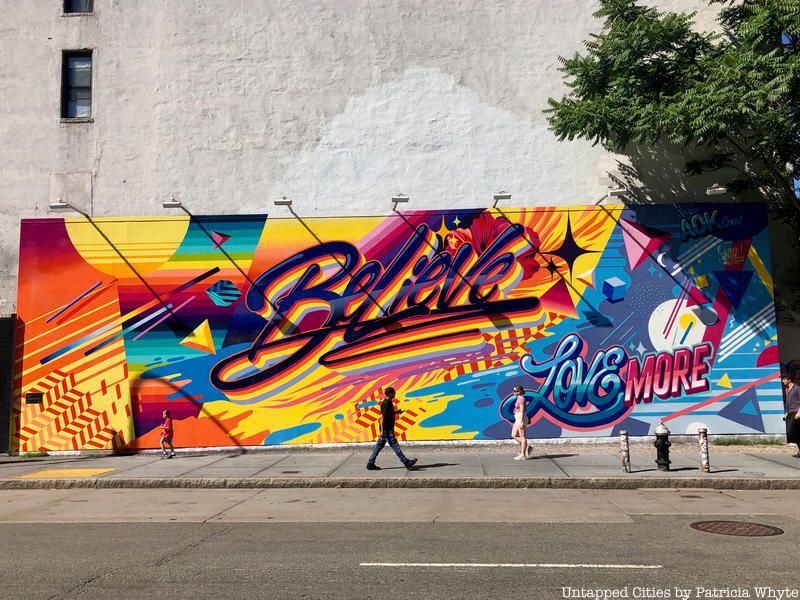
The spring and summer months are the busiest time of year for outdoor art installations, meaning now is the best time to head out discover all of the exciting new pieces popping up around New York City. Outdoor art takes on many forms this month as sculptures pop up on Roosevelt Island, screens alight in Times Square and the abandoned structures of Fort Totten get some new adornments. From dancing whales and clay birds to giant inflated balloons and playgrounds kids construct as they play, check out the new outdoor art installations not to miss this month:

Rendering courtesy FDR Four Freedoms ParkIn conjunction with one of the official WorldPride NYC/Stonewall 50 events for Pride month in New York City, FDR Four Freedoms Park on Roosevelt Island will install New York City’s largest-ever LGBTQ flag on the steps the park on June 14th, one day before the park’s World Pride celebration, which will include a VideoOut installation capturing coming out stories for their online library, food trucks for a picnic on the lawn, and a visit from Drag Queen Story Hour featuring books that focus on diversity and inclusivity from Little Bee Books.

Photo by Max TouheyFor the fifth year in a row, Citi Habitats in partnership with K&Co and Pliskin Architecture have collaborated to resurrect the Pop-Up Pool Party at Roosevelt Island‘s Manhattan Park rental apartments. Each summer since 2015, a new artist has been commissioned to transform the pool deck into an alluring and mesmerizing work of art that lasts only for each pool season. Previous artists such as HOT TEA, Andrew Farris, Gregg Emery, and Technodrome1 have each incorporated unique elements to the project but maintained a bright summertime feel. The design of the installation spans across the entirety of the pool deck allowing spectators to not only admire but also feel immersed within the art as they walk on top of it.
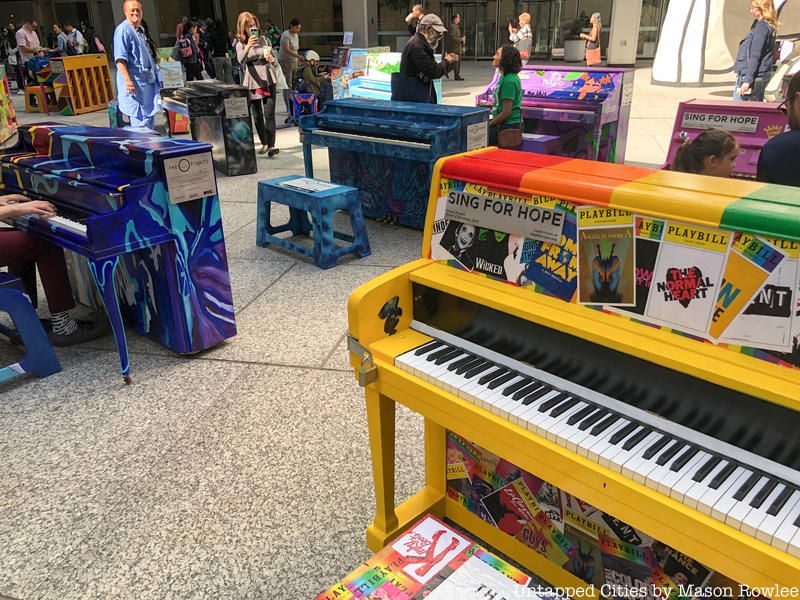
Sing for Hope organization celebrated its 500th piano placement throughout New York City’s five boroughs this month by showcasing 50 newly created works of playable art in Fosun Plaza at 28 Liberty Street. The placement of the organization’s 500th piano made New York the city with the largest number of public pianos in the world. The pianos will be available to the public from June 3–23 in a variety of locations across all five boroughs. For the full map of piano locations visit the Sing for Hope website or the Sing for Hope mobile app (available on the App Store). See more photo of the pianos here.

A changing of the guard has taken place in the Bowery. The Bowery Mural Wall, which was most recently covered in a colorful homage to the Lower East Sid by Bronx-based Tats Cru, will next be painted by Queen Andrea. Queen Andrea, or Andrea Von Bujduss, is an artist and professional graphic designer who started working on her Bowery mural in the end of May. She is known for using super bright colors and and fun bubbly text in her work. The Houston Bowery Wall has been a canvas for great art since the 1970s when Keith Haring painted a mural there. In the ensuing decades a variety of artists have been commissioned to leave their creative mark on the wall. Previous works featured on the wall include an anti-gun piece by world-renowned artist JR and a protest piece by Banksy.
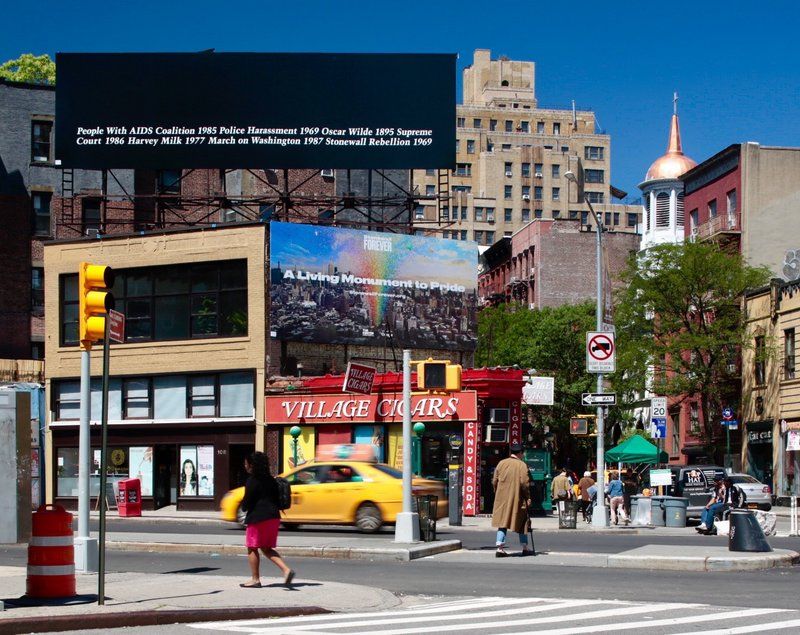 Felix Gonzalez-Torres, “Untitled”, 1989, Installation view of “Untitled” (Billboard). Sheridan Square, New York, NY. Mar – Sep. 1989. Organized by Public Art Fund. Photo courtesy of Public Art Fund, NY © Felix Gonzalez-Torres.
Felix Gonzalez-Torres, “Untitled”, 1989, Installation view of “Untitled” (Billboard). Sheridan Square, New York, NY. Mar – Sep. 1989. Organized by Public Art Fund. Photo courtesy of Public Art Fund, NY © Felix Gonzalez-Torres.
In honor of the 50th anniversary of the Stonewall Uprising and WorldPride, the Public Art Fund will display, once again, a piece it put up for the 20th anniversary of the uprising. Untitled, a black and white billboard created by Cuban-born artist Felix Gonzalez-Torres will return to its original spot in Sheridan Square in Greenwich Village, above Village Cigars and across from the historic Stonewall Inn bar, where it first appeared in 1989. The billboard contains two lines of white text that run across the bottom of a black background which read:
People With AIDS Coalition 1985 Police Harassment 1969 Oscar Wilde 1895 Supreme Court 1986 Harvey Milk 1977 March on Washington 1987 Stonewall Rebellion 1969
Gonzalez-Torres’ work through the mid-1980s included many date pieces with a similar black and white aesthetic, but this was his first billboard. The intention of these dated works is to “disrupt the hierarchy of chronology as well as the perceived distinctions between public and private histories.” Describing the piece in 1989, Gonzalez-Torres wrote, “The letters running across the lower part of the billboard suggest a long caption, capable of sustaining the projection of many images. The size of the letters is rather small for such a large space. This is not an ad; I don’t expect it to be readable while speeding down Seventh Avenue to the Holland Tunnel. I hope the public will stop for an instant to reflect on the real and abstract relationships of the different dates.” Presented in collaboration with The Felix Gonzalez-Torres Foundation with lead support by Google, the billboard will be on view throughout the entire month of June.

Photo courtesy New York Botanical GardenThe New York Botanical Garden is celebrating the legacy of famous Brazilian artist Roberto Burle Marx with one of its most immersive experiences yet: a combination museum, landscape, and performance collection. For the duration of the 2019 summer season, visitors to the botanical garden can expect more than just beautiful foliage but also a breathtaking tribute to Brazil, which combines the art and landscape of Burle Marx with traditional song and dance. Brazilian Modern: The Living Art of Roberto Burle Marx, is open through September 29, 2019
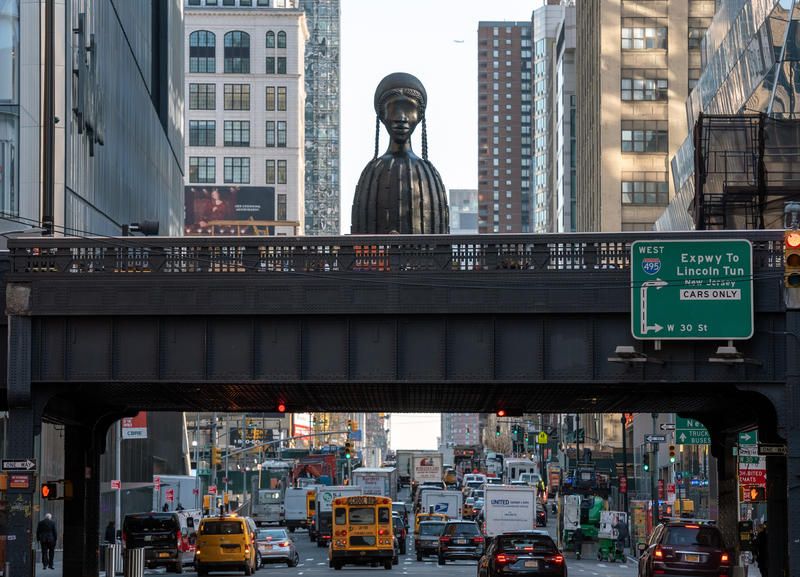
Simone Leigh, Brick House, 2019. A High Line Plinth commission. On view June 2019 – September 2020. Photo by Timothy Schenck. Courtesy the High LineFor about two months, Simone Leigh’s Brick House has been admired from afar as it loomed over 10th avenue. This month, visitors can get an up close look at the giant sculpture when the Spur, the newest section of the High Line opens on June 5th. It is the first sculpture to be displayed in the new space, which will host a series of rotating exhibits. Brick House, a sixteen-foot-tall bronze bust of a black woman. Her head is adorned with an afro and cornrow braids along her hairline. The figure sits atop the Plinth, a new exhibition space at on the plaza of the Spur. Brick House is the first work in the series Anatomy of Architecture by Simone Leigh. The series of sculptures will intermingle architectural forms from West Africa to the American South with the human body.
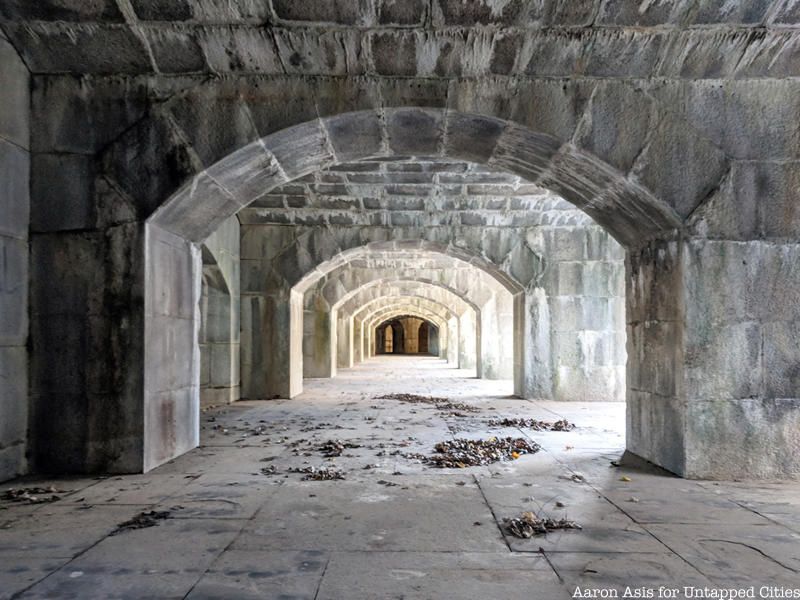
The abandoned military structures at Fort Totten Park are full of history and intrigue. This month, a one-weekend-only event will allow visitors to explore the park like never before. Fortified, a multifaceted event that will highlight aspects of the historic Fort Totten Park and inspire visitors to engage with stories of its past, will featured a brand new public art installation by New York City artist Aaron Asis and a theatrical experience by Justin Rivers. Asis’s piece is made up of cords that will weave through existing structural passages of the Water Battery, an impressive stone fortification that was partially constructed during the Civil War but ultimately abandoned and never completed. Asis will also install a series of wall markings that will note specific details, variations, or anomalies within the Battery structure. The installation will be accompanied by a theatrical experience inside the Main Magazine, a cavernous chamber where Rivers’ Dark Passages will be performed. There will also be ranger led tours of the off-limits ruins of the Endicott Battery. If you are an Untapped Cities Insider, you can experience the installations and tours before the park opens to the public on June 15th! Learn more about this experience and register for tickets here.
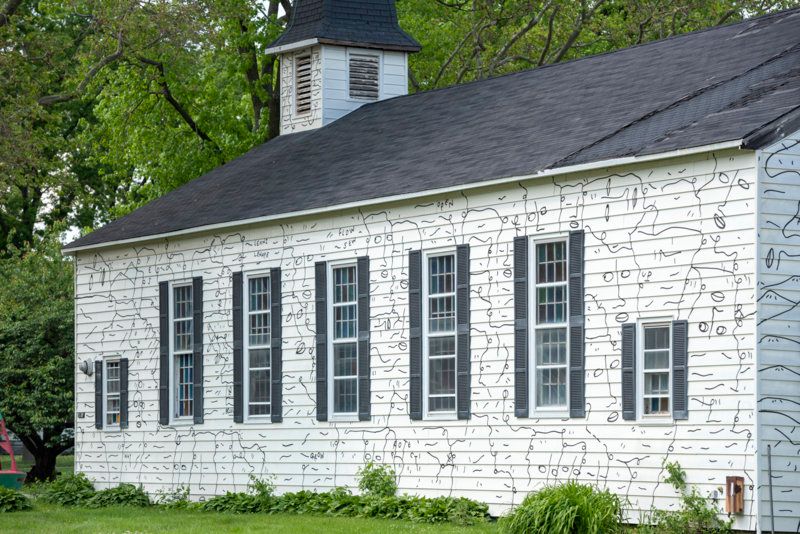
Photo by Timothy Schenk courtesy Trust for Governors IslandThis June, the historic Our Lady Star of the Sea chapel will be transformed by the signature black and white drawings of artist Shantell Martin. Our Lady Star of the Sea chapel is a former military chapel that was built in 1942 as part of an expansion of the former U.S. Army base on Governors Island. Martin’s work will be the first installation to activate the space which is located in the Island’s Historic District. Her drawings will transform the exterior of the chapel, wrapping all the way around the entire structure and encouraging visitors to circumnavigate the it as they follow the narrative of her images. The exhibition opens to the public beginning June 1st and will be on view daily through October 31. Throughout the fall there will be expanded, site-specific programming including poetry readings from the Poetry Society of America inspired by Martin’s work.
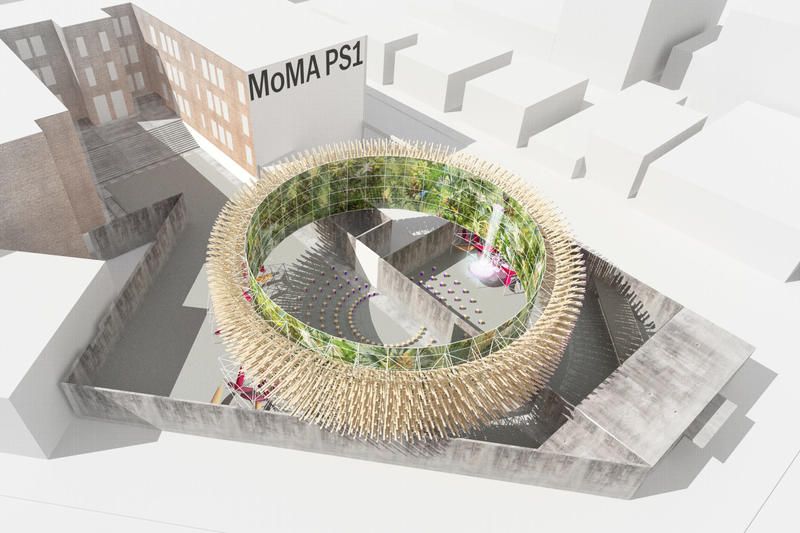
Hórama Rama by Pedro & Juana, winner of the 2019 Young Architects Program. Ana Paula Ruiz Galindo & Mecky Reuss. Mexico City, Mexico The courtyard of MoMA PS1 may soon resemble the rainforest more than New York City. The museum’s outdoor courtyard will be transformed this June by the winners of The Museum of Modern Art and MoMA PS1’s 20th annual Young Architects Program, Hórama Rama by Pedro & Juana (Ana Paula Ruiz Galindo & Mecky Reuss). Hórama Rama is an immersive junglescape set within a large-scale cyclorama that will hover over the museum’s exterior courtyard walls. The piece will stand forty feet tall and ninety feet wide and will feature a waterfall as well as hammocks crafted in Mexico. The installation, which will be on view from June 28th through September 2nd, will serve as a temporary venue for MoMA PS1’s outdoor music series Warm Up. Galindo and Reuss’s piece was selected from among five finalists who were part of the Young Architects Program. The program offers emerging architectural talent the opportunity to design and present innovative projects each year with challenge to come up with creative designs for a temporary and sustainable outdoor installations that provide shade, seating, and water. The architects must also work within environmentally sensitive guidelines.
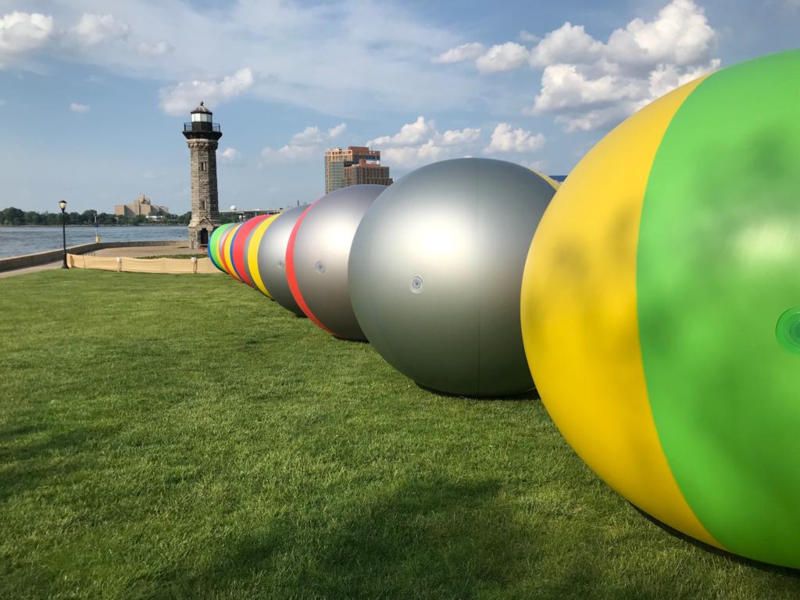 Photograph by Tom Aellen, Courtesyof FIGMENT NYC
Photograph by Tom Aellen, Courtesyof FIGMENT NYC
During the first weekend in June, Roosevelt Island’s Lighthouse Park will be transformed into an outdoor art wonderland as FigmentNYC takes over. The weekend long affair is a free participatory event “that celebrates creativity by challenging artists and participants to find new ways to create, share, and dream.” The event will include a variety of works from different artists. One of the biggest installations appearing at the festival is Phillip Krebb’s Lighthouse Beam. Lighthouse Beam colorfully interprets the Four Freedoms, as laid out in Franklin Delano Roosevelt’s address, and features Krebb’s often used medium of giant inflated balloons. Each freedom is represented by a different color on the balloons, which are arranged in a single line to represent a beam of light extending from the lighthouse. Lighthouse Beam precedes a large scale project, Flying Freedoms, which Krebbs anticipates for the Fall of 2020, which will cover the entire Four Freedoms Park as well as Southpoint Park in giant colorful balloons.
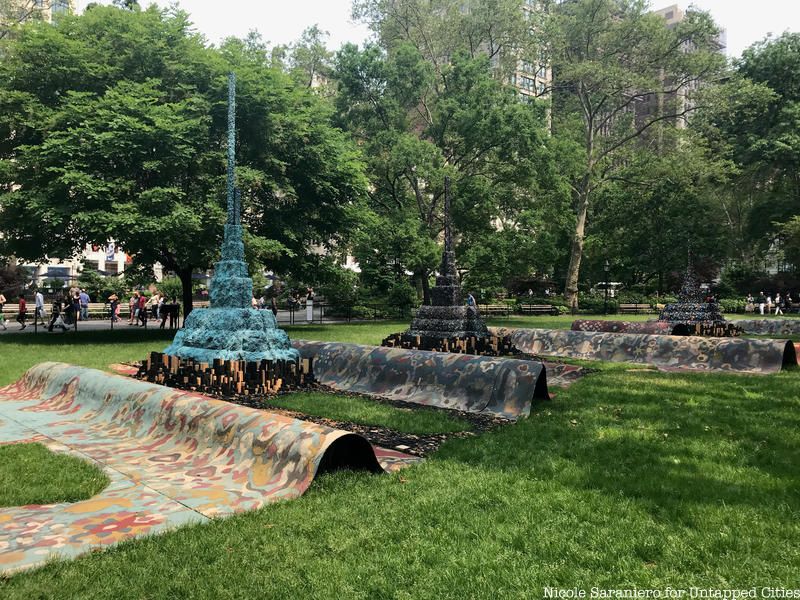
To mark the 38th commission of the Madison Square Park Conservancy, New York-based artist Leonardo Drew was chosen to create a monumental installation on the park’s Oval Lawn. Drew’s City in the Grass will present a topographical view of an abstract cityscape atop a multi-patterned, undulating and layered panorama. The installation stretches 100 feet long. City in the Grass is made of varied materials that spread across the lawn and, at various points, ascend into tall rising towers. The sculptures are set in a patterned surface that mimics Persian carpet designs and reflects the artist’s interest in East Asian decorative traditions and global design. The sculpture mixes domestic and urban motifs, spurring viewers to contemplate our relationship to the city we will in. City in the Grass will be on view from June 3, 2019, through December 15, 2019.
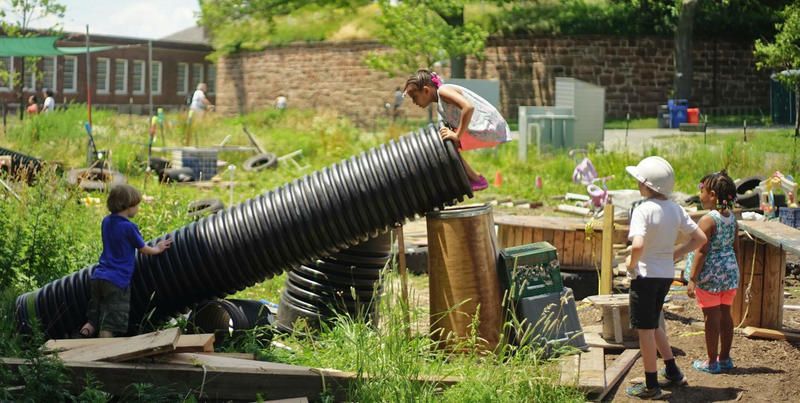
Courtesy of play:groundNYC
Hammers, saws and nails are usually not things you want to see on a children’s playground, but they are essential tools of play at this space on Governors Island. Play:groundNYC is a kids-only experimental adventure playground where parents aren’t allowed to interfere. Kids are given the freedom to play and create with the tools at hand, real tools that allow kids to experiment and take risks on their own.
Play:groundNYC is inspired by Danish landscape architect C. T. Sørenson’s proposed creation of “waste material playgrounds…where children would be able to play with old cars, boxes, and timber.” The first known playground of this type appeared in Denmark in the mid-1940s and several have popped up all over the world in the ensuing decades, including at least nineteen in New York City in the 1970s.
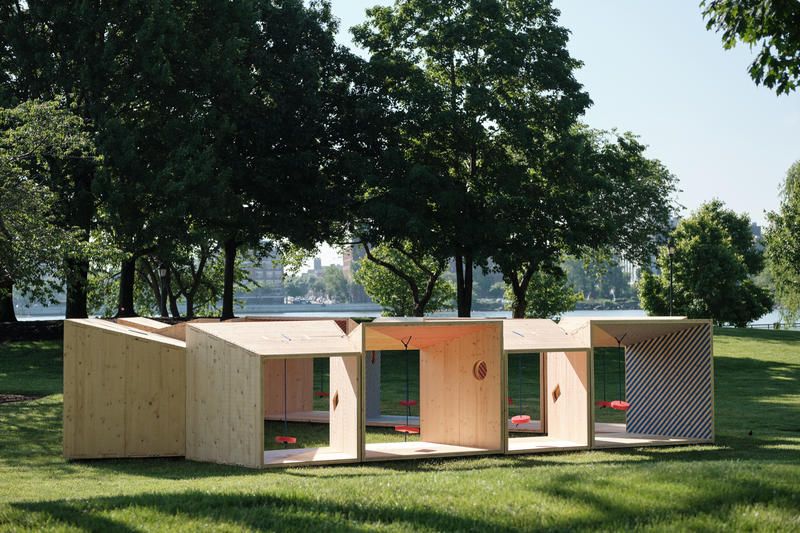 Photograph by James Lengs, Courtesy of FIGMENT NYC
Photograph by James Lengs, Courtesy of FIGMENT NYC
Another installation that will be unveiled at FigmentNYC is the Salvage Swing Pavilion created by Somewhere Studio. The Salvage Swing Pavilion was the winner of FIGMENT’s annual City of Dream Pavilion Competition, a contest challenges designers to consider the environmental impact of their designs and aims to promote sustainability-oriented thinking in the architecture and design communities. Unlike most of the FIGMENT installations which will only be up for the weekend, this pavilion will remain through August. Salvage Swings is made up of scrap cross-laminated timber panels salvaged from an ongoing construction project at the University of Arkansas. There are twelve swing modules that frame the swinger and the swinger’s view. All of the modules are identical in size but vary with different painted patterns, hatches and windows. Not letting any material go to waste, the wood cut out for windows is used to make the swing seats. At Roosevelt Island, the modules are organized in a triangular form which enable community swinging, creates a covered seating area and a interrupted visual field (great for hide-and-seek games), and a large central space which can be used to host community events. The modular design allows for the swings to be easily separated following the summer installation so they may be relocated to parks and schools across New York City as individual swings.
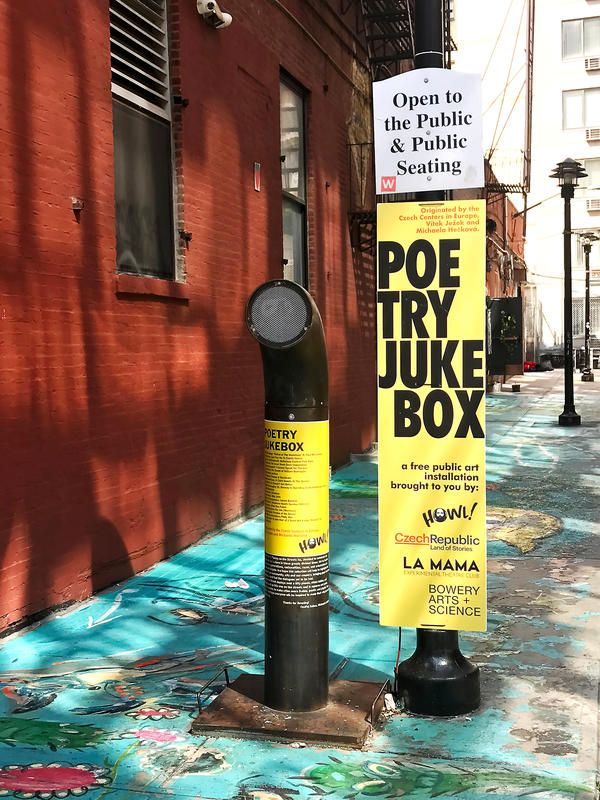 Photograph by Ted Riederer
Photograph by Ted Riederer
A new poetry jukebox has popped up outside Howl! Happening, a gallery, performance space and archive in the East Village, and Extra Place, where it was located in 2017. The poetry jukebox is loaded with poems by writers like Allen Ginsberg, James Baldwin, Hettie Jones, Margaret Randall and more. The poetry jukebox first appeared at the Howl! Festival 2017 where coffeehouse owners from the Czech Republic introduced the funky speaker as part of an installation. The over two dozen poems were curated by Bob Holman and BC Edwards and represent a collective response to social justice.
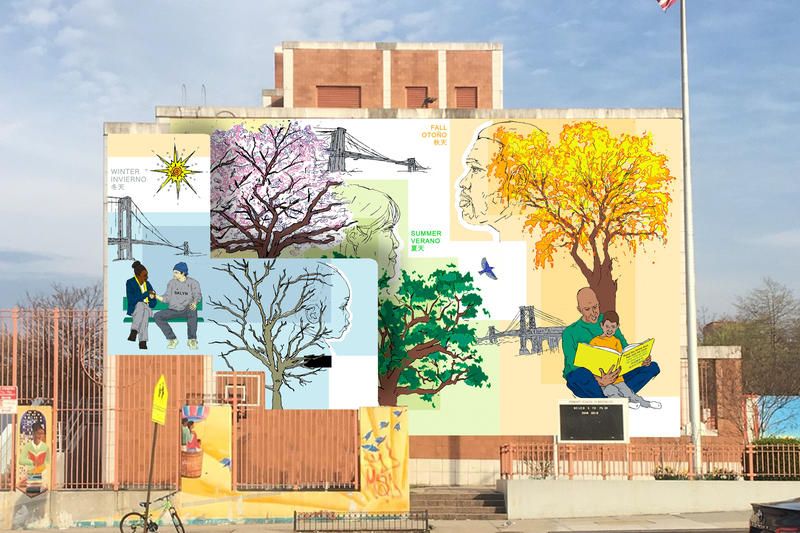
Feeling All Four Seasons, Bridging All Four Seasons” by artist Julia Cocuzza and members of Baltic Street, AEH, Inc., will be installed on PS 24K at 427 38th St. in Sunset Park, Brooklyn. The NYC Mural Arts Project aims to erase the stigma of mental illness while enhancing the physical environment of New York City’s communities through beautiful, collaborative, murals. Two new murals will be unveiled this month in Sunset Park, Brooklyn and Graniteville, Staten Island. The designs were developed by local artists in collaboration with neighborhood residents, people with mental health conditions, and peer specialists through a series of public events and weekly workshops in the community. The murals were even partially painted by community members at two community paint-fests. The first mural, Feeling All Four Seasons, Bridging All Four Seasons is by artist Julia Cocuzza and members of Baltic Street, AEH, Inc. It will be installed on PS 24K at 427 38th St. in Sunset Park, Brooklyn. The second mural, We are a Connected Community is by artist Alice Mizrachi and members of Venture House, and will be installed on PS 22 1860 Forest Avenue in Graniteville, Staten Island.
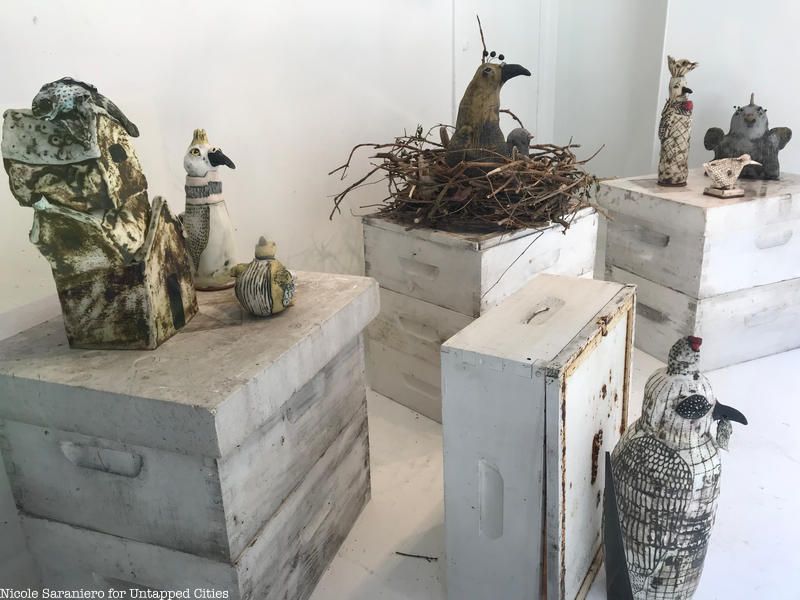
A group of thirty ceramic birds have flocked to the Garment District Space for Public Art. Endlings: The first, and last of their kind is an installation made up of hand-built, folk-art inspired birds created by Pennsylvania artist Laurie Carretta-Scupp. Scupp was inspired to craft these creatures by watching birds from her studio as they fluttered around her backyard, sang songs, and made abrupt flights and landings. Each of the three-dimensional figures represents a specific character within the story Scupp is telling throughout the installation. Scupp’s work is often influenced by fairytales, folklore and nature. It seeps into every aspect of a piece, from the theme and subject matter to the materials she uses, like the earthy clay used to make these birds. The material also reflects an acknowledgement of environmental responsibilities, and a “celebration of the intrinsic beauty in which these subjects both embody and inspire.”
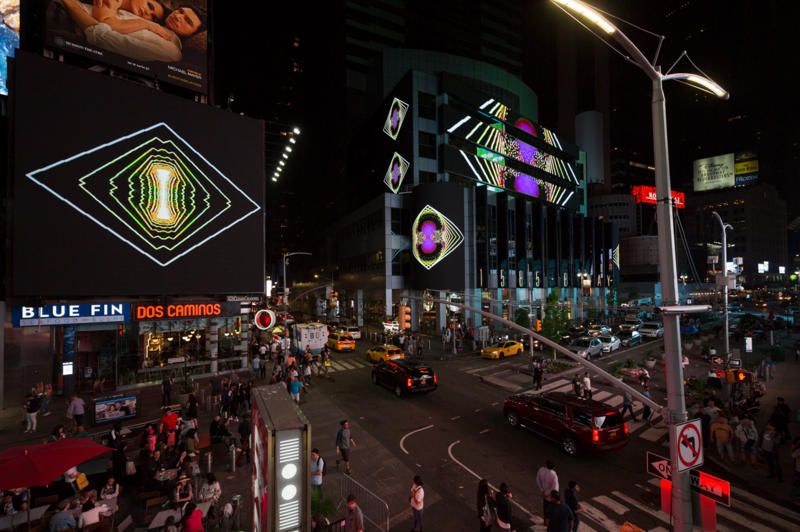
Photo by Ka-Man Tse for times Square ArtsEvery month a new video installation takes over the screens of Times Square at midnight. The videos run every night at midnight. This month, the screens will be taken over by Jason Akira Somma, a Virginia based filmmaker, choreographer, and self-proclaimed “hacker” who has been featured in Midnight Moments before. This time Somma will present his Times_Square_Analog_Portrait, a conceptual portrait of the very electronic billboards it will be displayed on. The piece was created using footage of Times Square’s electronic billboards, video feedback enlivened with hand-operated camera movements, and signal manipulation using electromagnetic and light frequency information he recorded in Times Square on custom analog devices. Somma wants viewers to thinking about the space the art is in as well as the tools used to create it. Somma’s portrait of Times Square is one of three interpretive portraits of the area that will be presented as Midnight Moments this summer.
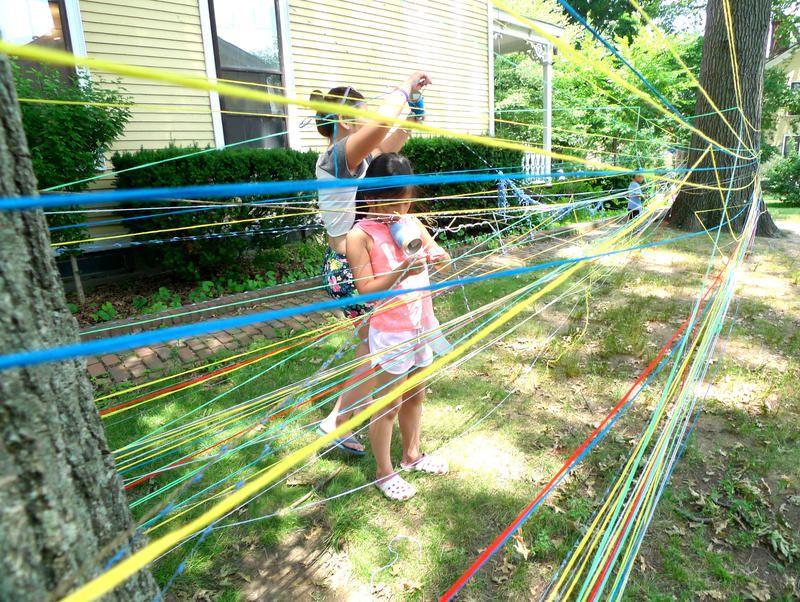
Courtesy of the Children’s Museum of the ArtsAt the Children’s Museum of the Arts Island Outpost, kids can get creative at free hands-on art-making workshops and art-viewing experiences. On weekends, the open outdoor space of Free Arts Island Outpost allows families to become inspired and explore big projects using a mix of found objects and traditional mediums. Inside the CMA’s historic home on the island there is a fine arts studio and media lab where they run week-long summer camps from June through August. Through these camp experiences, children can explore a host of different artistic mediums from photography, and sustainable sculpture to animation and film.
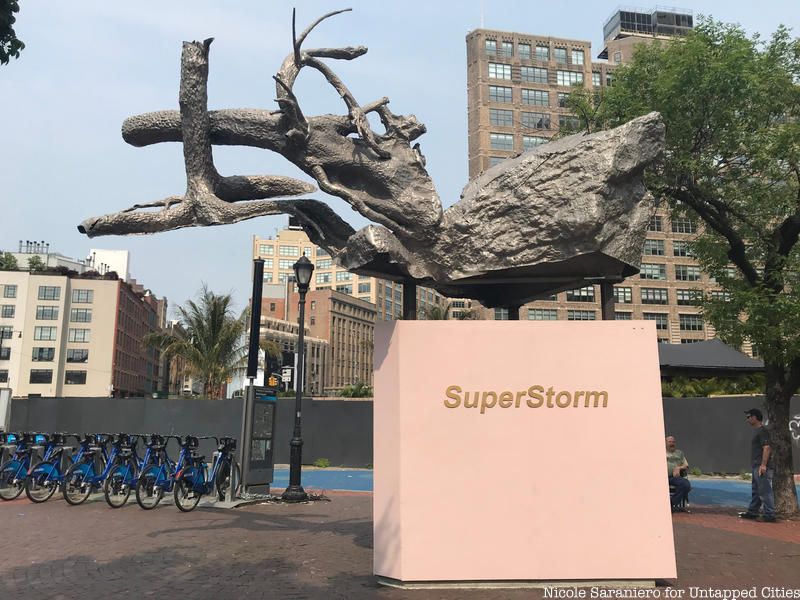
A new sculpture in Duarte Square Park commemorates one of the most intense natural disasters New York City has faced. Inspired by the destruction of Superstorm Sandy, Robert Lobe’s sculpture takes the shape of the storm’s wreckage. Superstorm is made up of hammered metal in the shape of a tree and boulder that were blown apart during the storm. The form was captured by actually taking a cast of the tree and boulder in the forest. The tree once stood in the forest along the Appalachian Trail in Northwest New Jersey at Harmony Ridge Farm and Campground. During the storm, the tree was blown over and Lobe said “it had become a majestic horizontal sculpture with a flat circular root pattern spiraling vertically into the air, evidence of the shallow yin and yang sloping surface of its former boulder home.” The art piece shows “the unfriendly side of nature” and how superstorms are becoming a more intense and frequent problem as our climate changes. Superstorm can be found at the intersection of Avenue of the Americas and Canal Street until June, 2020. Read on to see what outdoor installations are still on view from previous months and which pieces are going away this month!
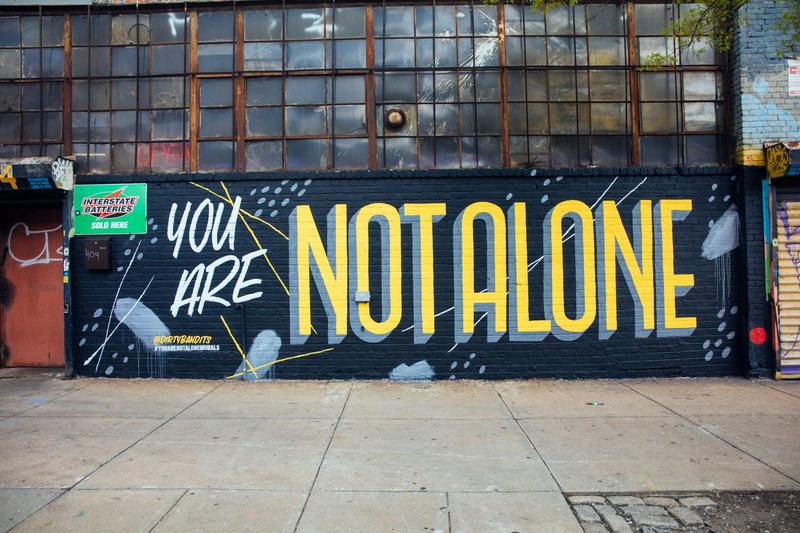
Photograph by Graham Burns, Mural art by Annica Lydenberg Three murals, all bearing the same message of “You Are Not Alone,” have popped up in three different locations in Brooklyn. The murals feature art by Dirty Bandits, Adam Fu, and Jason Naylor, and are part of a Mental Health Awareness Month campaign which launched in May. All three feature the same color palette and message while displaying the artists’ individual styles. The goal of the project, whether people are exposed to it in person or online via #youarenotalonemurals, is to make the viewer “feel seen and supported, no matter what challenges they are facing.” The project was started by designer, illustrator, and mural painter Annica Lydenberg (Dirty Bandits) and Samantha Schutz, a mental health advocate and critically-acclaimed author of the anxiety disorder memoir, I Don’t Want to Be Crazy. They hope the project will spread throughout the country and are looking for people to volunteer their wall space.
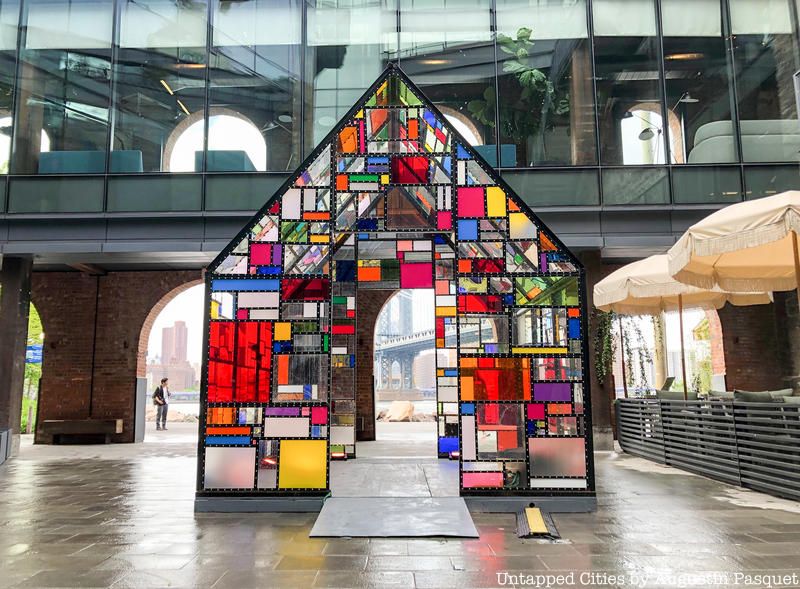
A glass house by Tom Fruin, the Brooklyn-based artist known for colorful glass mosaic watertowers and other structures, is on display in the open-air courtyard of of Empire Stores along the Brooklyn waterfront for the month of May. Kolonihavehus, a plexiglass and steel sculpture of reclaimed materials that is inspired by the shape of a garden house, has been a well-known fixture in New York City – following appearances in Manhattan, Brooklyn Bridge Park, and most recently, North Brooklyn Farm at Domino Park – and around the world. Tom Fruin confirms for us that this glass house will be at Empire Stores until the end of June.
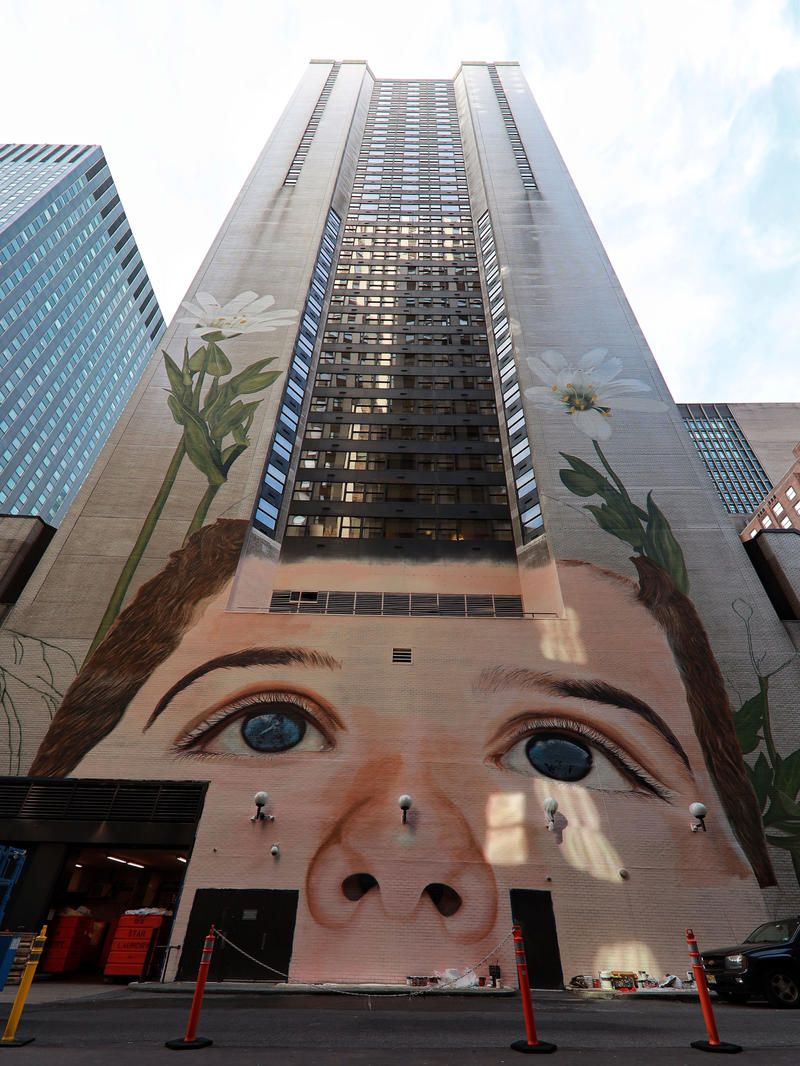 Photograph Courtesy of Just_A_Spectator, Art by Jorge Geralda
Photograph Courtesy of Just_A_Spectator, Art by Jorge Geralda
The International Labor Organization (ILO) has partnered with Street Art for Mankind (SAM) to create murals around the United Nations headquarters in Midtown, Manhattan. These murals will inspire ILO’s key themes of “decent work” for all, and crafting a better “future of work” in celebration of 100 years of the International Labor Organization. The murals are some of the largest ever created in New York City, with Jorge Geralda’s Midtown mural, on the wall of the Westin Hotel Grand Central, extending up to thirteen stories. Five murals have been created by well-known street artists like Clandestinos, Faith 47, Jorge Gerada, Mr Cenz and Victor Ash, all emphasizing ideas such as eco-friendly jobs, youth employment, gender equality in the workplace, and child labor. You can create your own self-guided tour of the murals by downloading the app Behind The Wall, which will provide maps, audio guides and insights on each work.
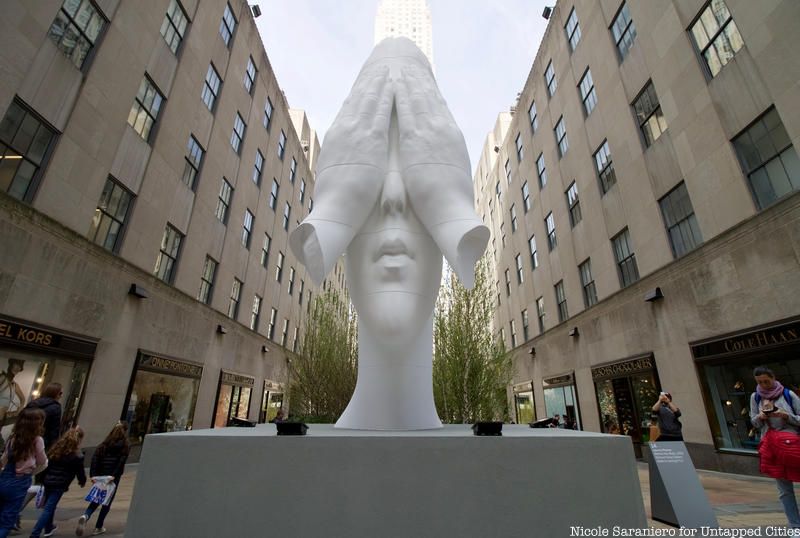
In partnership with Frieze New York and Tishman Speyer, Rockefeller Center presents Frieze Sculpture, a free public art installation that features 20 different sculptures by 14 international artists, all on display throughout the Center, including Rockefeller Plaza, the Channel Gardens and the Rink. Some notable artists include Nick Cave, Sarah Sze, and Juan Miro. You can create your own, self-guided tour of the 14 works by downloading the Frieze Art Fairs App, which provides an audioguide and a map. Check out more of our photographs here. Frieze Sculpture will be on display from April 25, 2019 to June 28, 2019.
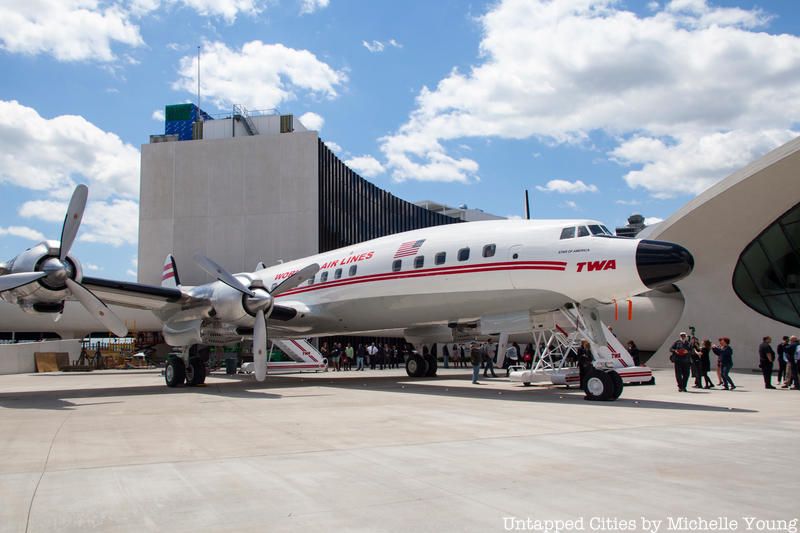
The most anticipated event of last month was undoubtedly the opening of the TWA Hotel on May 15th at John F. Kennedy Airport. While there is much to take in, design and architecture-wise, it’s “Connie” that straddles the line between art installation and entertainment venue. Having traveled from Maine, to JFK Airport to Times Square and back to JFK, Connie is a 1958 Lockheed Constellation, re-outfitted as a retro cocktail lounge. “Connie,” just over 116 feet long and 23 feet high, will be located in the same place it was parked more than 50 years ago, in 1962 (back when JFK was still called Idlewild Airport). Starting mid-May, guests can enjoy drinks and snacks inside the fuselage, as well as play with the authentic controls inside the plane’s cockpit.
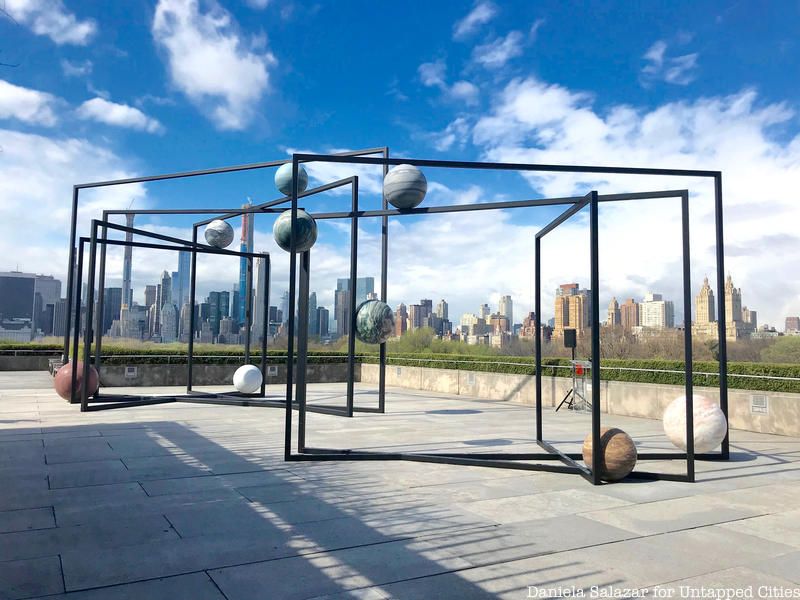
The Metropolitan Museum of Art Roof Garden Commission has a new work for the season. Parapivot, by Alicja Kwade is a duo of works made out of steel and stone to capture a miniature solar system. Kwade is a Berlin-based artist who seeks to “heighten both the mystery and absurdity of the human condition in order to enhance our powers of self-reflection.” This piece will be on display on the Iris and B. Gerald Cantor Roof Garden until October 27, 2019. Parapivot is Kwade’s first solo exhibition at a museum in the United States.
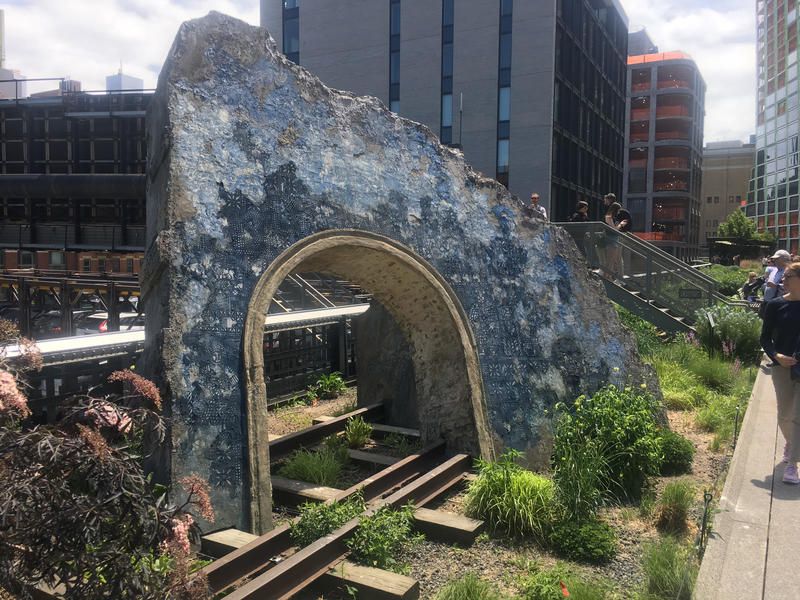
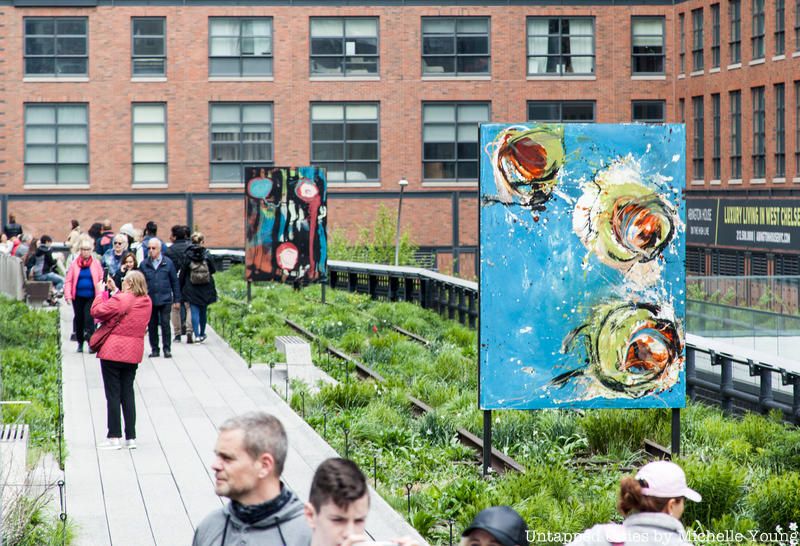
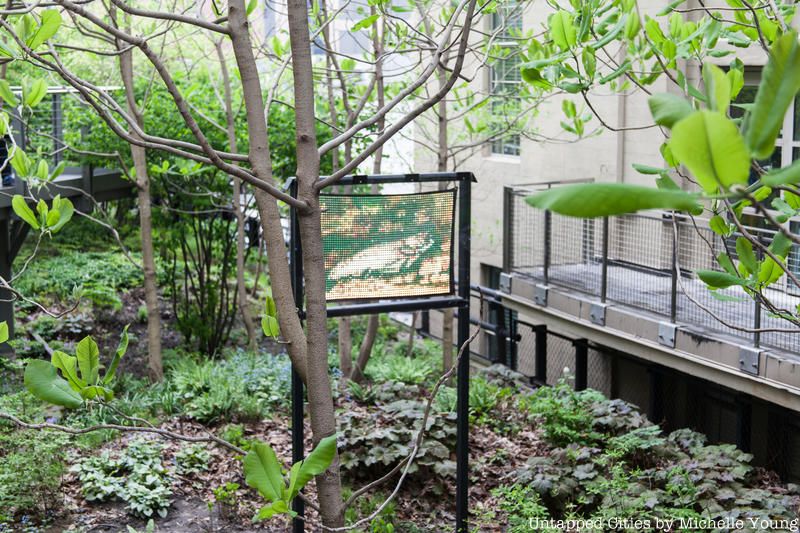
“En plein air” refers to the 19th century practice of painting outdoors, something inspired by, and a reaction to, the extreme changes happening in urban areas during the Industrial Revolution. The High Line, being a remnant of New York City’s industrial era, is the perfect place to reexamine and re-explore the tradition of outdoor painting, and with the involvement of several international artists, En Plein Air is an annual installation that challenges conventional sculptures and murals with freestanding, outdoor paintings that explore and restructure the relationship between art, nature and the modern urban city. The first work above at 20th Street is by Firelei Báez, she depicts a Haitian Sans-Souci Palace ruin that looks like it is collapsing into the High Line. As High Line Arts describes, “In this ongoing body of work, Báez examines incarnations of Sanssouci: the 18th century Rococo palace built by Frederick the Great, the palace of Haitian Revolution leader and proclaimed first King of Haiti Henri Christophe, and Haitian revolution leader Jean-Baptiste Sans Souci, who was assassinated by Henri Christophe.” The second work, a series of four resign paintings, above is by Ryan Sullivan, embedded into the rail lines and plantings at 29th Street. At 26th Street. Japanese artist Ei Arakawa has created two LED light paintings of fish, an interpretation of French painter Gustave Courbet’s 1872 and 1873 paintings, both titled La truite (The Trout). Other works include hundreds of striped flags at the Western Rail Yards by French artist Daniel Buren (known for his columns at the Palais Royal in Paris), ceramic archways by American artist Sam Falls embedded with fossilized plants from the High Line, life-size portraits on reclaimed doors from Georgian townhouses by Tanzanian artist Lubaina Himid, a large-scale sculpture at The Spur by Lara Schnitger, and a series of unstretched canvases inspired by an artist Vivian Suter Argentian home greet visitors at the southern edge of the park. En Plein Air will be on display at several locations on the High Line from April 19, 2019 to March 30, 2020.
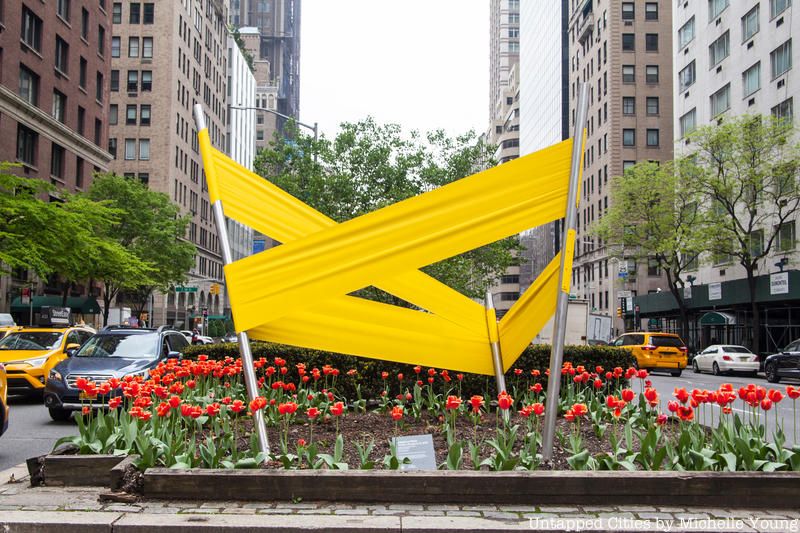
The Park Avenue Malls have been a place for artists to show off their works for years, and now Joseph La Piana’s Tension Sculptures are on display, taking on the form of five different structures exploring questions of “passive materiality.” Each sculpture takes on a different shape and dimension, and all are comprised of yellow, rubber sheets stretched almost unbelievably tight around thick, steel beams. The tension visualized in these “living sculptures,” as La Piana describes them, is supposed to parallel the current political and social climate while also portraying hope, as these are materials that, though pushed to their limits, will not collapse. Tension Sculptures will be on display on Park Avenue at 53rd, 57th, 60th, 67th and 70th Streets until July 28, 2019.
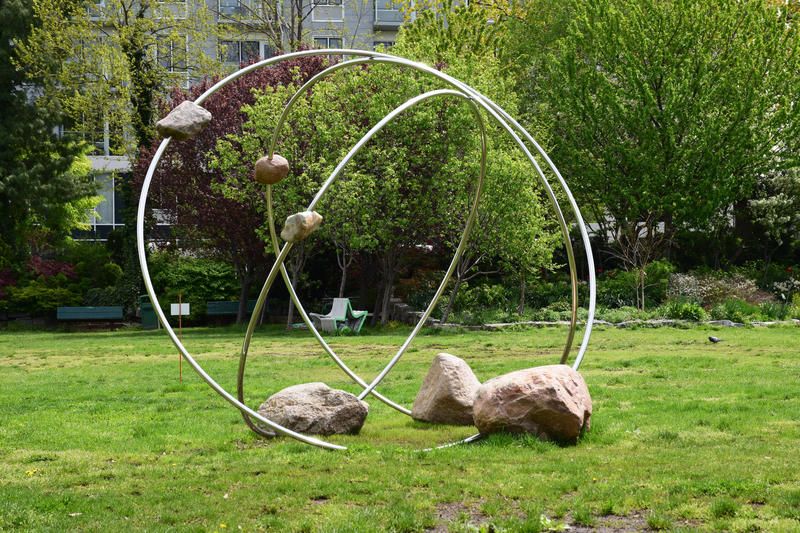
Photograph courtesy of Sara MorganOpening on May 5, 2019, Chronos Cosmos: Deep Time, Open Space is a multi-collaborative exhibition in Socrates Sculpture Park that will highlight and put into question our preconceived notions of time, space, matter and our relationship to them and each other. Eight different artist will create art installations for the Long Island City waterfront park, taking advantage of the open-air environment, and present their personal interpretation of time, history and space, taking inspiration from an array of sources including astrophysics and non-western modes of thought. The goal is to upset and reorient the viewers’ perspectives on time and space, revealing alternative ways of interacting with the world and the people in it. The artists participating in the exhibition are Radcliffe Bailey, Beatriz Cortez, Alicja Kwade (whose work is also on the Met Museum rooftop) Eduardo Navarro, Heidi Neilson, Miya Ando, William Lamson, and Maria Rapicavoli, and the exhibition will be on display until September 2, 2019.
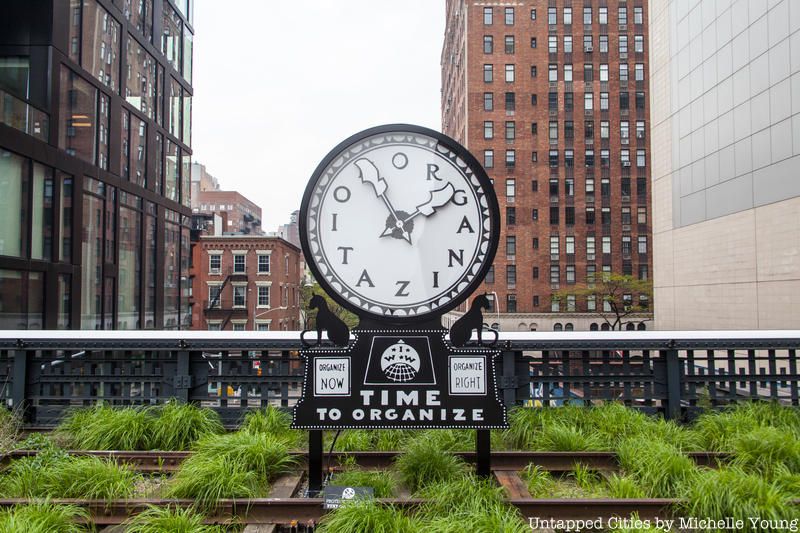
Ruth Ewan’s large-scale, double-sided clock, visible from the street, is based on the Industrial Workers of the World (IWW) labor union’s illustrations; the clock was once one of the many images used on “stickerettes,” otherwise known as “silent gators,” and distributed by union members as they travelled from job to job. The clock was an homage to the round-the-clock work of the union, as well as a callout to factory owners and how they divided public and private time. Ruth Ewan’s work now serves as a call to action for today’s labor struggles and the fight for diminishing labor rights, including the five-day work week and eight-hour work day. Ruth Ewan’s Silent Agitator is the artist’s first public installation in the United States and will be on display on the High Line Park at 24th Street from April 3, 2019 to March 31, 2020.

Rendering courtesy NYCDOTAs part of NYCxDESIGN this year, The Design Trust for Public Space and NYC Department of Transportation installed their latest El-Space pilot installation in Long Island City (following up last year’s pilot in Sunset Park that is still in place). El-Space is a design proposal that will apply to millions of square feet of El-Space across the five boroughs, the underutilized space below elevated tracks. El-Space is “the first comprehensive approach in the nation to create a more hospitable pedestrian experience, greater environmental resilience, and enhanced lighting beneath and adjacent to elevated transportation infrastructure citywide.” The goals of The El-Space project are to “improve pedestrian mobility and safety, foster environmental health, and link neighborhoods to jobs and amenities.”
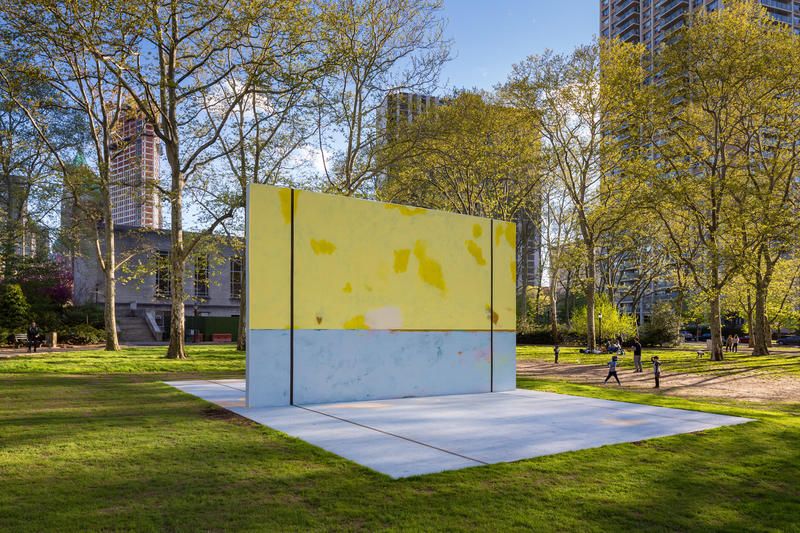
Harold Ancart, Subliminal Standard at Cadman Plaza Park presented by Public Art Fund, 2019. Photo: Nicholas Knight, Courtesy of Public Art Fund, NYIn May The Public Art Fund unveiled Subliminal Standard, an interactive commission by Belgian artist Harold Ancart. Set up in the northern end of the Cadman Plaza Park in Brooklyn, Subliminal Standard is a large painted concrete sculpture inspired by the handball courts made popular in the 1900s by U.S. immigrants. The installation will be a place of play and interaction, inviting the viewers to immerse themselves in the piece and consider the relationship between handball courts, playgrounds and abstraction. Subliminal Standard is Ancart’s first public art commission in the United States, and will be on display until March 1, 2020.
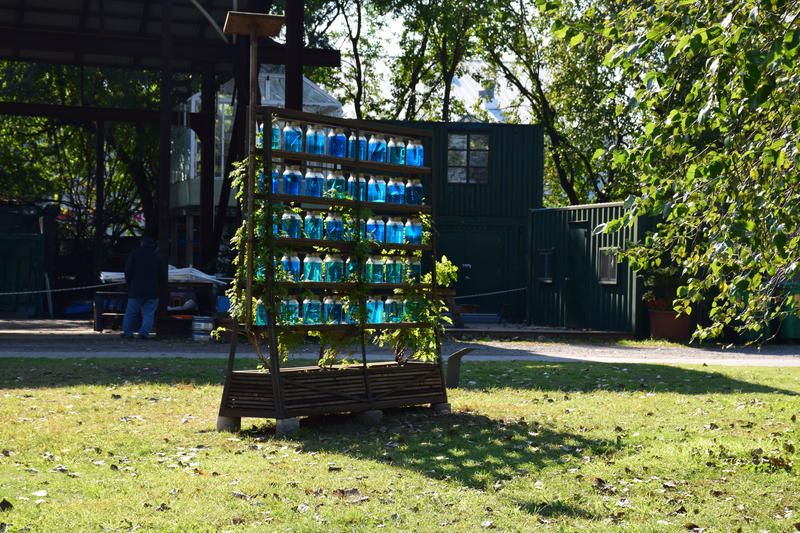
Photograph courtesy the Artist and Socrates Sculpture ParkLeander Knust’s Re-Material Wall uses a solar panel to power the electroforming process that transfers copper molecules from their suspended pipes to the wires in each, solution-filled jar. The molecules will then accumulate and form their own unique designs, as the steel rusts, wood bends and sculpture “decays.” Re-Material Wall is one of many works of Knust that explores decay, growth and the process of change. Knust’s Re-Material Wall will be on display at the West 111th’s Street People’s Garden from April 14, 2019 to April 13, 2020.
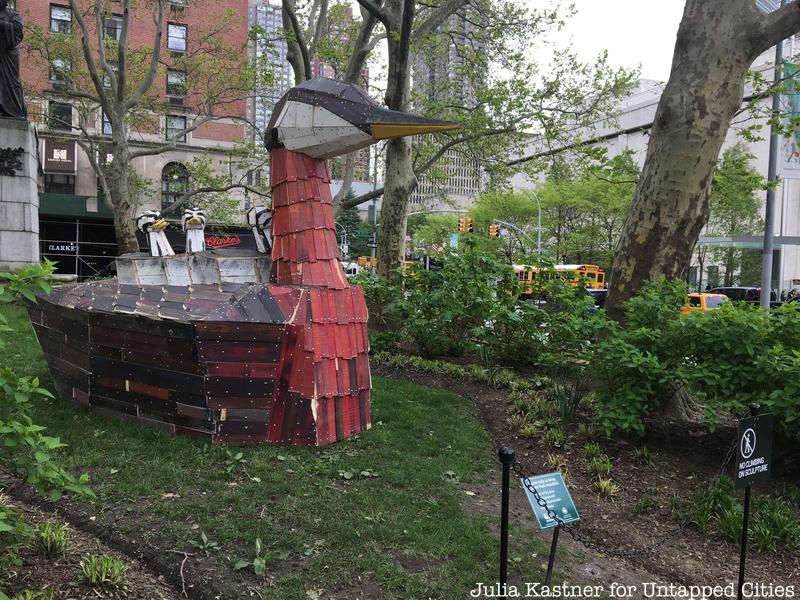
In partnership with New York City Audubon, Broadway Mall Association, New York City Parks Department, and Gitler & Gallery, artist Nicolas Holiber presents, “Nicolas Holiber: Birds on Broadway, Audubon Sculpture Project”. The National Audubon Society posted its Birds & Climate Change Report in September 2014, which cautioned that half of all North American bird species will be endangered over the coming decades as a result of global warming. Artist Nicolas Holiber chose 12 out of the 145 species of birds that reside in New York City to include in the Audubon Sculpture Project. The twelve sculptures will be made out of reclaimed wood sourced from the city itself and located between 64th and 157th Streets. The project seeks to bring “attention to the plight of birds threatened by climate change while simultaneously bringing beauty to the urban landscape.” This installation will open later this month.

Image courtesy Mathew Jensen.Morbid Anatomy has a new, temporary home in Green-Wood, a National Historic Landmark that was one of the first rural cemeteries in America. In Green-Wood’s historic Fort Hamilton Gatehouse, Morbid Anatomy will display Heaven, Hell, and Purgatory: Visions of the Afterlife in the Catholic Tradition, an exhibition which will contain art and artifacts that revolve around the Catholic view of the afterlife and how that view has affected and guided the masses. The items will be taken from both the Morbid Anatomy community and The Green-Wood Historic Fund Collections, and for those interested in learning more about the intersection between death, art and culture, the gatehouse’s attic will contain Morbid Anatomy’s extensive library and other collections.
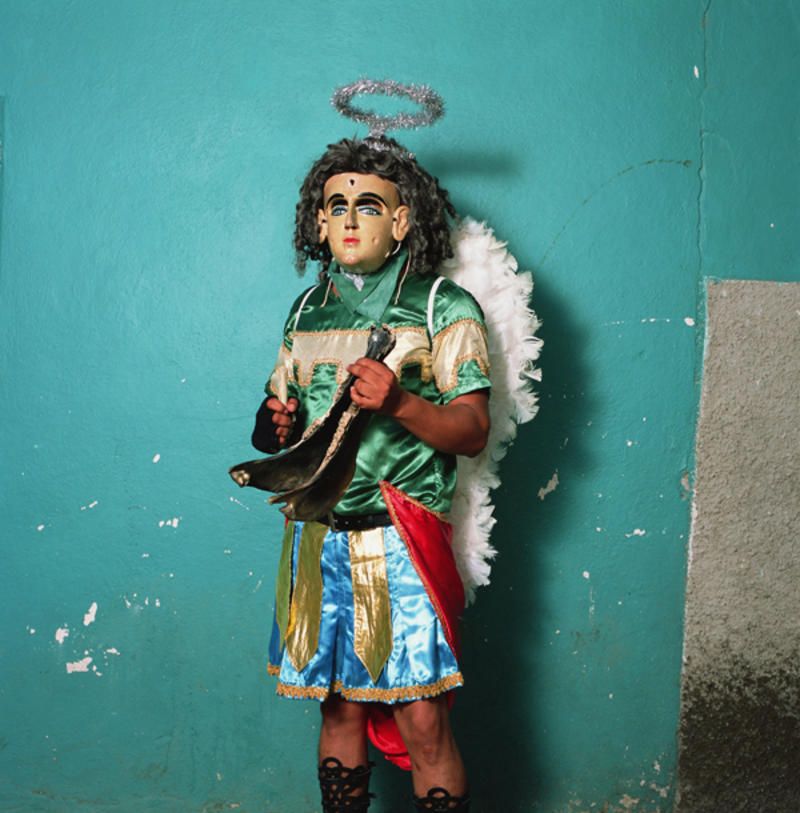
Angel with Charrasca, Equine Jawbone Instrument, 2017, Phyllis Galembo, taken in Mochitlán, Mexico; Collection of Joanna EbensteinHeaven, Hell, and Purgatory: Visions of the Afterlife in the Catholic Tradition will be on display from April 20, 2019 to June 30, 2019.
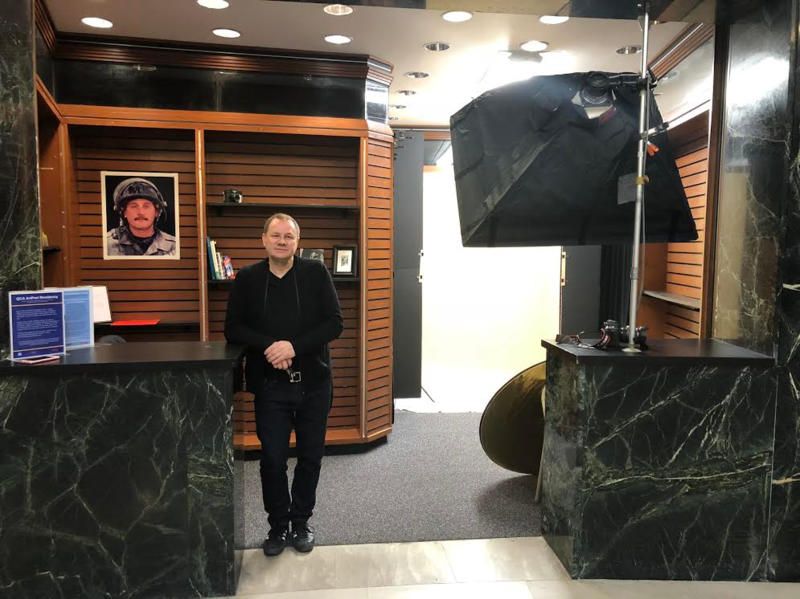
Photo courtesy Port Authority of New York & New JerseyHolger Keifel has officially started his residency at LaGuardia Airport’s historic Marine Terminal A as part of his photography project A Portrait of Contemporary Travel, in which he will explore what it means to travel today and what the contemporary traveler looks like. The Queens-based artists invites LaGuardia’s travelers to sit for a portrait and share their personal travel stories with him, the goal being to create an authentic “snapshot” of the diverse group of people flying in and out of the city. Keifel wants to present people as they are, no staging or photo manipulation, in order to tell the real story of people’s lives. He has done similar photo series on professional boxers and 9/11 first responders. Keifel’s A Portrait of Contemporary Travel is supported by the Queens Council on the Arts and the Port Authority of New York & New Jersey, and he will occupy the airport terminal’s studio for the next three months.
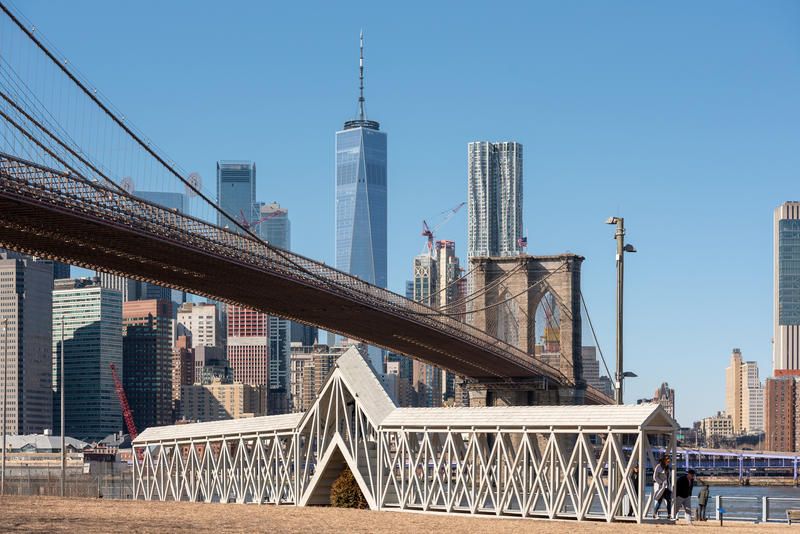
Siah Armajani, Bridge Over Tree, 2019, photograph by Timothy Schenck, courtesy Public Art Fund, NYSiah Armajani’s public art installation Bridge Over Tree debuted at Walker Art Center in Minneapolis in 1970. Nearly fifty years later, the piece will be on display again in a re-staging at Brooklyn Bridge Park starting February 20th. The piece blurs the line between art and architecture, as does most of Armajani’s work which consist largely of outdoor structures. Bridge Over Tree is a 91-foot-long walkway with a shingled roof and stairs at the middle that arch over a small tree. The piece, presented by the Public Art Fund, will be installed between the Manhattan and Brooklyn Bridges on the Empire Fulton Ferry lawn. Bridge Over Tree is the only outdoor piece associated with Siah Armajani: Follow This Line, a new retrospective exhibit of Armajani’s career at the Met Breuer. The installation will be up until September 29, 2019.
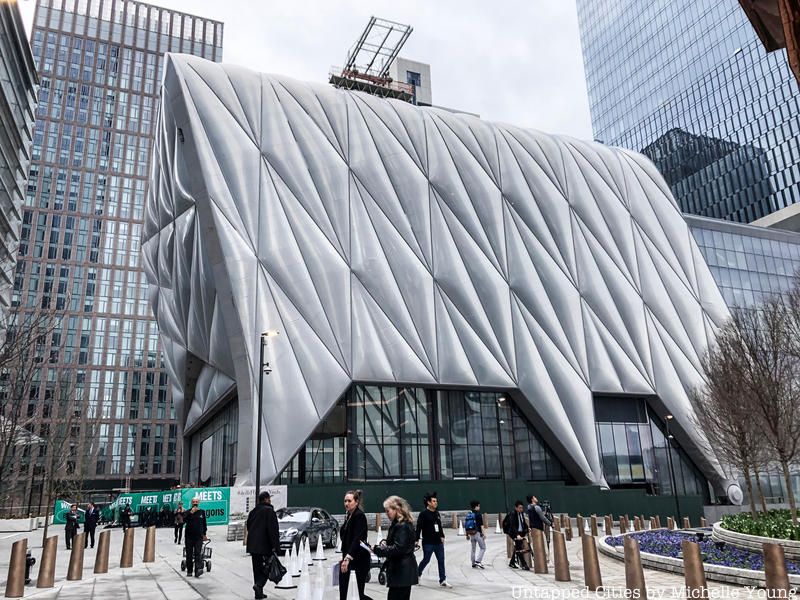
The Shed at Hudson Yards, which opened to the public on April 5, 2019, is a new indoor/outdoor center for the arts. Its groundbreaking structure was designed by Diller, Scofio + Renfro, Lead Architect, and Rockwell Group, Collaborating Architect and will adapt and transform to accommodate all disciplines and all audiences. The Shed’s June programming will feature the art exhibition COLLISION/COALITION which includes three new commissions that wary in medium and approach, but all explore the role of art in the interaction of opposing social, cultural, and political forces. This month will also see the premier of a new kung-fu musical, Dragon Spring Phoenix Rise, co-conceived by Chen Shi-Zheng and Kung Fu Panda’s Jonathan Aibel and Glenn Berger, with songs by Sia and choreography by Akram Khan. The play follows the conflict between a twin brother and sister fighting for control of a secret sect in Flushing, Queens, that possesses the magical power to extend human life. The only permanent installation at The Shed is In Front of Itself by Lawrence Wiener. Weiner’s piece is a site-specific installation embedded in The Shed’s plaza. The Shed is the latest structure to open at Hudson Yards, following the official grand opening of the new neighborhood on the far West Side of Manhattan, along with the opening of the Vessel.
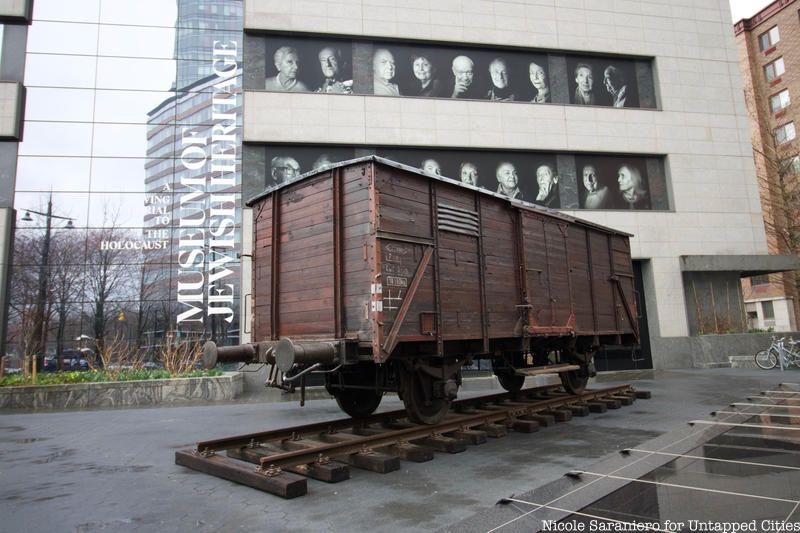
In Battery City Park at the Museum of Jewish Heritage, an actual artifact from the early twentieth century is now on display. This freight car is not a replica and was actually used by the German National Railway during World War II to transport soldiers, prisoners of war, and then Jews to killing centers. The freight car is an element of the upcoming exhibition Auschwitz. Not long ago. Not far away. will be on view until January 3, 2020 and include over 700 artifacts from World War II never before seen in the United States.
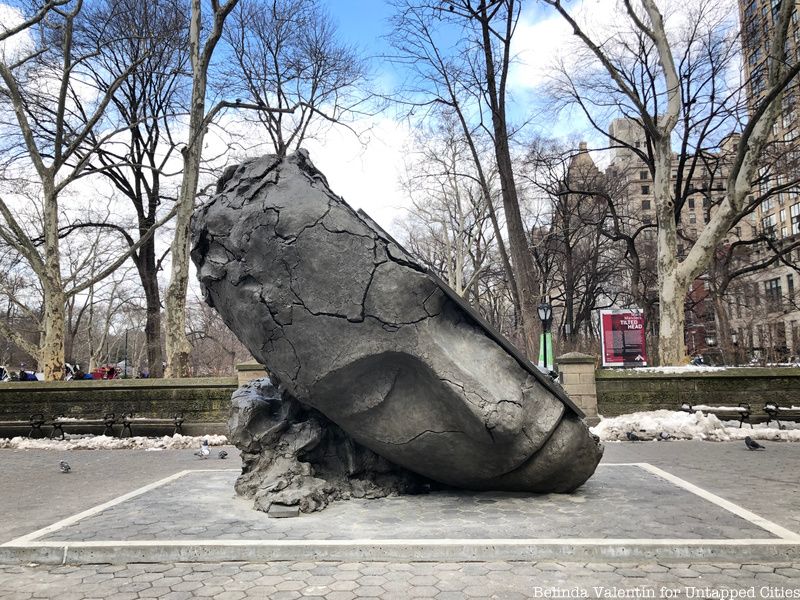
On March 6, Dutch artist Mark Manders’ largest single cast bronze sculpture opened at the Central Park entrance at 60th Street and 5th Avenue. Titled Tilted Head and debuted by the Public Art Fund, the 13-foot-tall human head is made of clay-looking bronze and was commissioned for Doris C. Freedman Plaza. Tilted Head is Mark Manders’ “largest single cast bronze sculpture to date” and this is the first time it’s been in New York City. The mysteriously unfinished sculpture’s cracks juxtapose the tranquil expression on the head’s face. The installation will be on display until September 1, 2019.
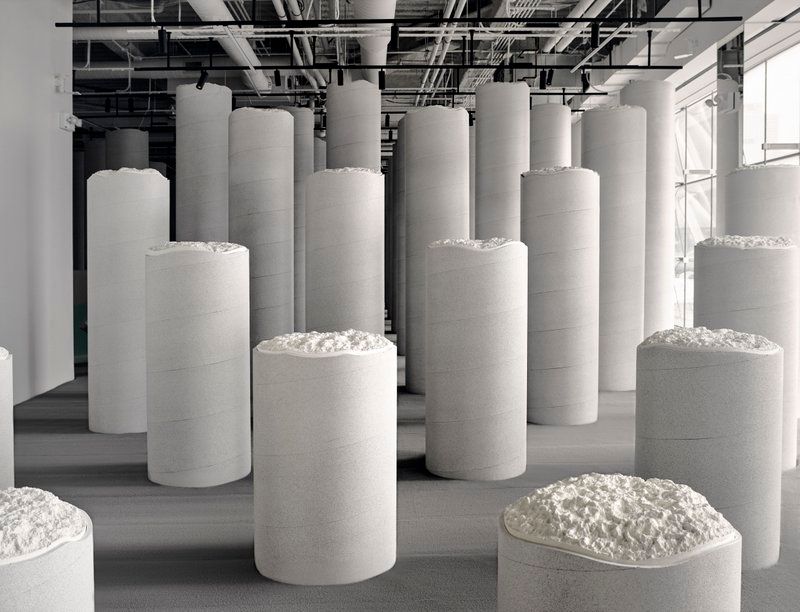 Photograph by Noah Kalina courtesy of Snark Park/Team Camron
Photograph by Noah Kalina courtesy of Snark Park/Team Camron
Snark Park is Snarkitecture’s new permanent exhibition space in Hudson Yards and its inaugural exhibition, Lost and Found, was opened to the public on March 15. Lost and Found will “encourage visitors to lose themselves in a labyrinth of massive, inhabitable columns, some of which are large enough to occupy and many of which offer unique audible, visual, and tactile experience.” Described as a “modern-day enchanted forest,” the exhibition hopes to challenge visitors to interact with the installation and reveal secret worlds through the material changes and twists of Lost and Found. This exhibition will be one of three hosted by Snark Park this year, and will be on display through August 2019.
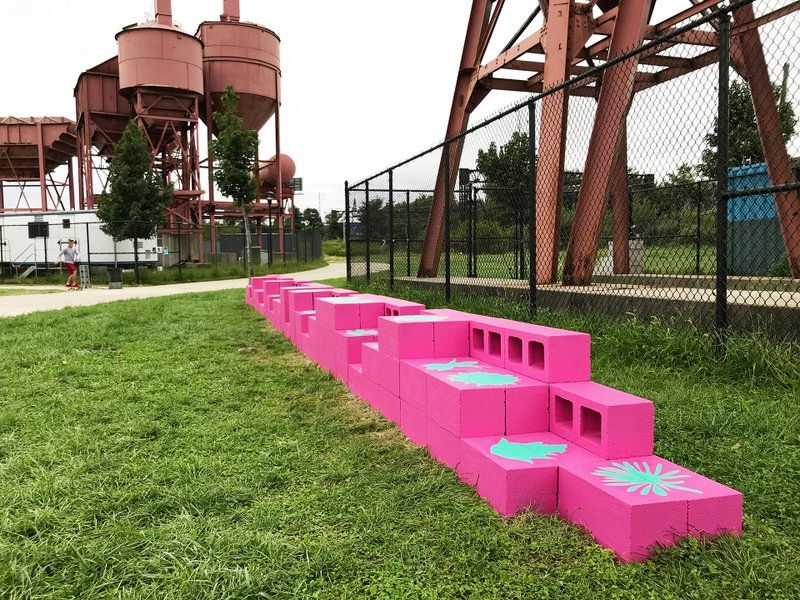
Photo courtesy Sohhee Oh, via NYC ParksA relatively new NYC Parks Art in the Parks installation is up in Concrete Plant Park in the Bronx. Artists Sohhee Oh, Lovie Pignata, and Moses Ros have created a three connected works: a long bench of painted concrete blocks that reference native plants from the Bronx River Foodway, geometric concrete pavers that are inspired by Bronx’ original native dwellers, the Mohegans, along with its current diverse population and colorful flags at the entrances of the a park that were designed in conjunction with the local community. Concrete Plant Park was previously a location for Swale, the foragable floating food forest. The installation will be up until September 27, 2019.
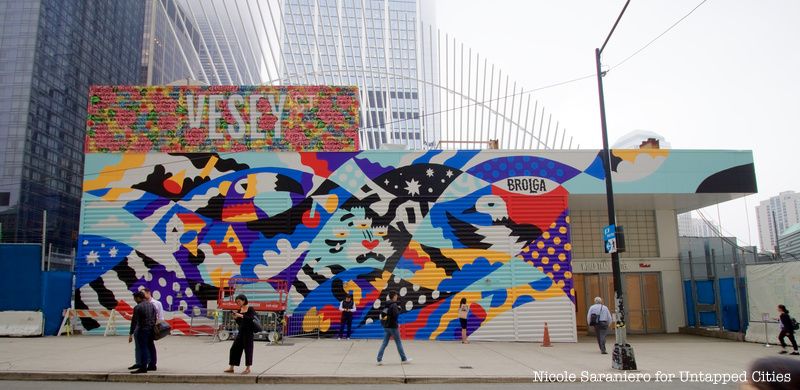
Vesey mural by Chinon Maria and Sebastian MitreWhile construction of 2 World Trade is on hold, a collection of corrugated metal sheds housing mechanical equipment have been spruced up by artists from around the world to make the area look less like a construction zone and more like a hip pedestrian throughway. The sheds, which are bounded by Greenwich, Vesey and Church Streets and the Oculus transportation hub, feature murals by Australian illustrator Brolga, Los Angeles-based artist Todd Gray, Korean-born Joohee Park, aka Stickymonger, the husband and wife team of Chinon Maria and Sebastian Mitre, Japanese-born, New York resident Riiisa Boogie, and Bronx native Hektad. There are a total of eight murals to see.
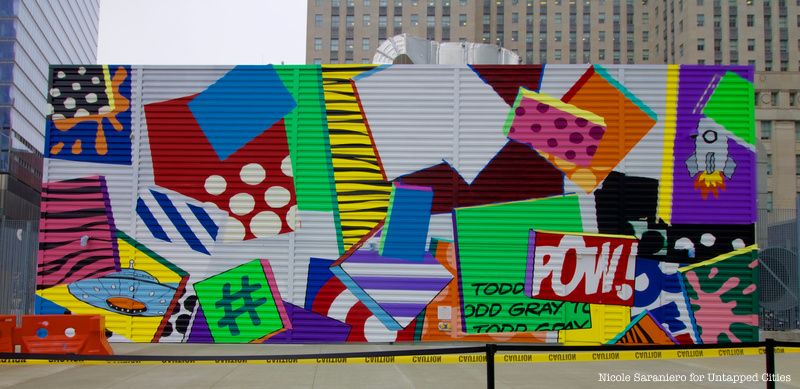

During NYCxDesign Week 2018, we were honored to be a partner of The Design Trust for Public Space in the launch of El-Space, a long-term pilot installation located under the Gowanus Expressway in Sunset Park at 36th Street and 3rd Avenue, just adjacent to Industry City. El Space is the product of a five year, critical exploration in how New York City can better activate the forgotten, unfriendly spaces beneath aging elevated infrastructure and culminates in this first pilot installation that showcases what an alternative walkway beneath the Gowanus Expressway could look like. El-Space was designed with input from the diverse local community through charettes and on-site pop-up workshops, including work with students at Sunset Park High School and members of a Community Advisory Board.The design tests strategies for lighting, green infrastructure, and urban design for replicability, aesthetics, and of course, how the public uses and engages with it. El-Space will be installed for about a year, used to test and refine strategies for future permanent activations. For the passerby, it’s a cool visual addition to an industrial space and for the community, it has created a new meeting spot.
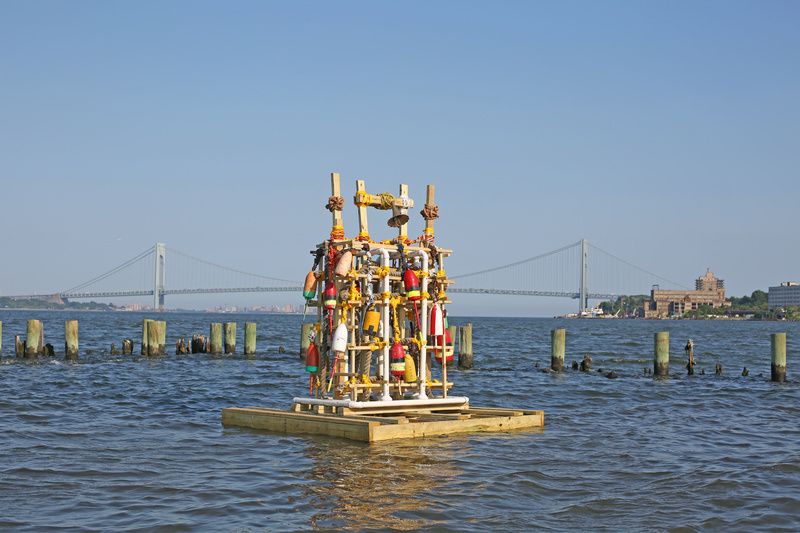
Photograph courtesy of Design Trust for Public SpaceSonic Gates is a public art installation that features a series of eight sound sculptures and murals in Staten Island placed along the waterfront, on Bay Street, and in Tappen Park. The installation is part of a larger project titled Future Culture: Connecting Staten Island’s Waterfront by the Design Trust for Public Space in partnership with Staten Island Arts. Works include the piece in the photograph above, which was made by Arthur Simms and is on display in the harbor off the Stapleton Esplanade, and a piece by DB Lampman, on display in Tappen Park, which consists of an assemblage of wind chimes that hang over the head of its viewers and encourages them to engage with the piece using senses besides sight. “The Future Culture pilots will highlight our borough’s rich cultural assets, from the Bay Street commercial corridor bustling with restaurants, stores and art centers, to Parks locations where dynamic community activities are taking place, to the spectacular waterfront, where we are reflecting Staten Island’s deep maritime heritage,” said Elizabeth Bennett, Executive Director at Staten Island Arts. Akin to the Design Trust for Public Space’s initiatives to reactive underutilized spaces under elevated highways (to be covered later in this article), this initiative looks to “inspire Staten Islanders and visitors to walk the underused pathways and unleash new possibilities for regenerating public spaces as a valuable community asset,” said Susan Chin, Executive Director, Design Trust for Public Space.
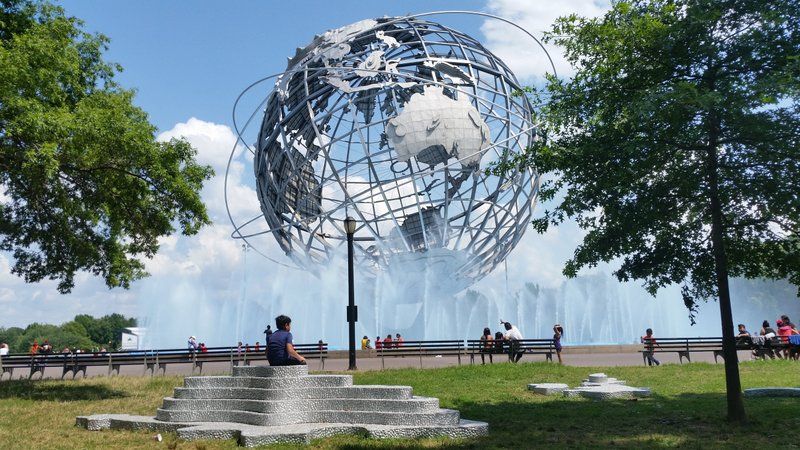
Photo courtesy Zaq Landsberg via NYC Parks
Around the Unisphere in Flushing Meadows Corona Park sit the sculptures that comprise Zaq Landberg’s Islands of the Unisphere (yet another of the UNIQLO Parks Expressions Grant program). The Unisphere monument, a fixture of the park, is a large sculptural globe with recognizable land masses, but without labels and borders. Landberg expanded on this famed monument by choosing islands off of the Unisphere, recreating them at scale, and placing them horizontally on the grass. The islands act as seating, stages, and meeting places, community spaces that encourage people to forge connections and reflect on the tremendous diversity of Queens. Unisphere will be on view until June 10, 2019.

Image courtesy of James and Karla Murray
James and Karla Murray’s exhibit Moms-and-Pops of the L.E.S. is part of 10 Uniqlo Park Expressions that are on view across the city. This piece is a pop-up that debuted July of 2018 in Seward Park on the Lower East Side. Moms-and-Pops is a life-sized structure that displays four large photographs of mom-and-pop ships that have closed in the Lower East Side, such as Cup & Saucer and Chung’s Candy & Soda Stand.The installation seeks to highlight the disappearance of small businesses like bodegas, coffee shops, luncheonettes, delis, and newsstands that used to be numerous in the Lower East Side. The artists state that the piece seeks to represent the “small businesses that were common in the Lower East Side and helped bring the community together through people’s daily interactions.”A combination of metal and wooden materials makes the sculpture weather-proof and capable of lasting the entire year, perhaps a nod to the legacy of these now extinct businesses of the Lower East Side. Moms-and-Pops of the L.E.S will be on view until June 19, 2019.
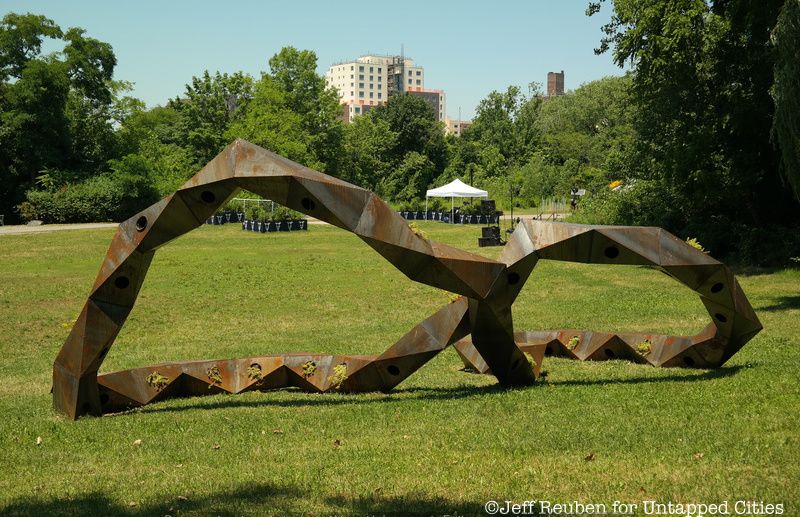
River Rising/Sube el Rio: An Exposition of Science, Art and Technology is an outdoor public art sculpture exhibition in Starlight Park in the Bronx. The exhibit opened on June 30, 2018, in a weekend of parades, dancing, and live music to celebrate the revitalization of the Bronx River and Starlight Park. The installation is composed of eight large-scale public art sculptures by various artists curated by the Bronx River Art Center. The sculptures are meant to be enjoyed as “modern pavilions” that can be utilized as public community spaces. The sculptures pay homage to the 1918 Bronx International Exposition of Science, Arts and Industries. The installations will be on view until June 29, 2019.

Photo by Alexander Atkins, courtesy of the artistIn July of 2018, Tribeca Park unveiled artist Rebecca Manson’s first public sculpture, a monumental public art piece titled Come Closer and the View Gets Wider. The piece consists of thousands of handmade, glazed porcelain parts that are fused together to create a magnificent eight-foot orb. As the title and the composition of the piece suggests, the perspective at which the piece is viewed impacts the viewer’s perception. Each of the thousands of hand-crafted parts appear rather insignificant on their own and from afar, appear to blend in to the seamless piece. Collectively, the small pieces are crucial to creating the whole piece, which stresses the impact of small things coming together to create something greater. The work will be on display until July 2019.
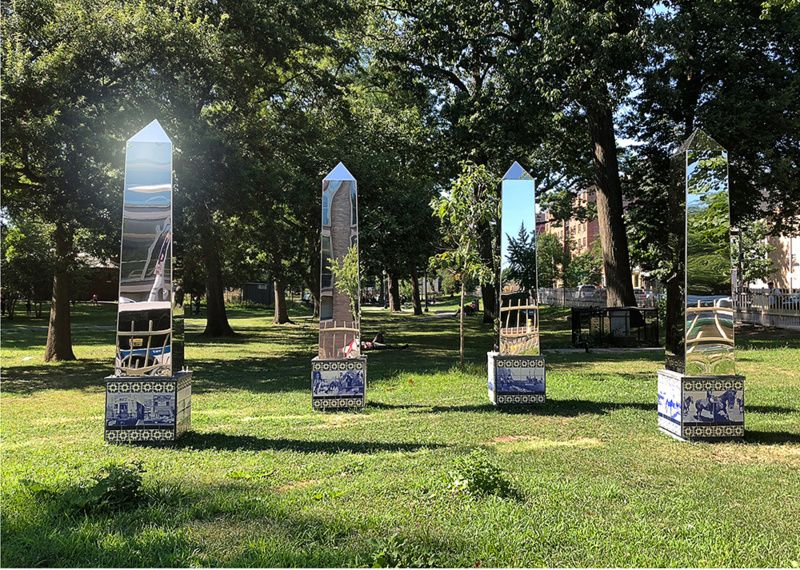
Photo by Rose DeSiano Courtesy of New York City Department of Parks & RecreationRose DeSiano’s Absent Monuments, also part of the UNIQLO Parks Expressions Grant, is on view in Queens’ Rufus King Park until June 2019. The installation is constructed of several mirrored obelisks that feature Dutch Delft photographic tiles that explore the history of the park, as well as floral tiles inspired by Native American patterns. The mirrored surfaces confront the viewer with their reflection and subtly prompt them to reflect on their own identity and their situation within the history of Jamaica, Queens, which is full of colonization, war, abolitionism, immigration, and rural urbanization. Simultaneously, the tiles pay homage to the history of Native American people and address the patterns of cultural displacement that have occurred in Queens. Absent Monuments will be on display until June 30, 2019.
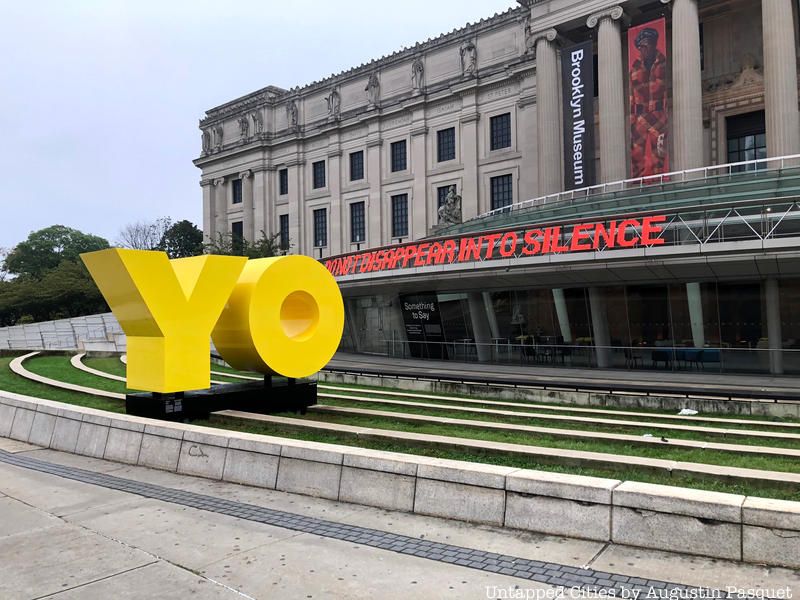
Deborah Kass’ OY-YO sculpture made a splash when it debuted in Brooklyn Bridge Park in 2015. Meant to be seen in both ways, it serves as a welcome point between different cultures. OY-YO spent some time in Williamsburg after Dumbo, and arrived at the Brooklyn Museum in October of 2018, joining other works in the Something to Say exhibition of text-based works by Brooklyn-based artists Brooklyn Hi-Art! Machine, Kameelah Janan Rasheed, and Hank Willis Thomas. According to the press release, “In Prospect Heights and neighboring Crown Heights, OY/YO takes on new meaning, as it speaks to the longstanding, complex, and ever-evolving social dynamics between Black, Latinx, and Jewish communities in the neighborhood. At the Brooklyn Museum, OY/YO will function as a new greeting, welcoming visitors to the museum connecting to a diverse audience, while also saying “hey” to locals. OY-YO will be on view at Brooklyn Museum until June 30th, 2019.
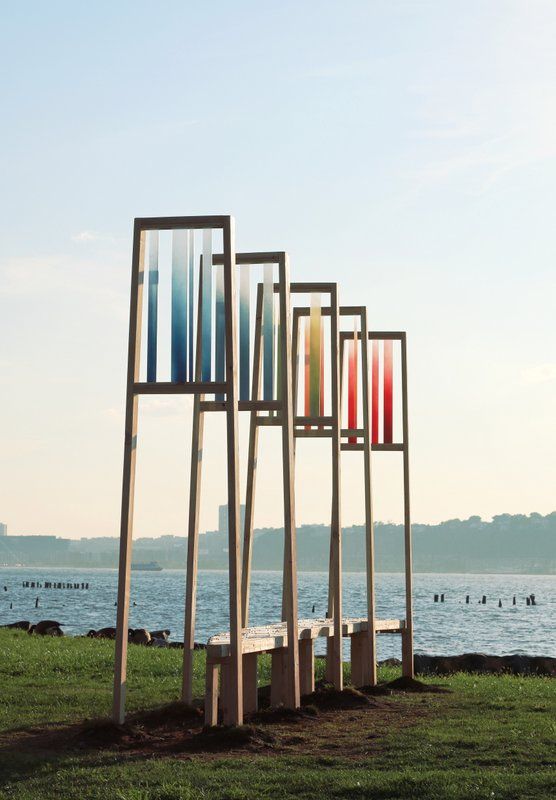
Photo courtesy Sarah E. BrookViewfinding, a large-scale public art installation in Riverside Park by Gowanus-based artist Sarah E. Brook, features a series of reclaimed lumber and cast-acrylic panels, with engraved text written by 26 queer-identified poets. The acrylic material is selected for its translucency and will shift in color depending on the sunlight and time of day. The poets selected include not only established ones, but also not yet published ones as well. Viewfinding is located along the Hudson River in Riverside Park at 67th Street and will be up until August 22nd, 2019.
Subscribe to our newsletter